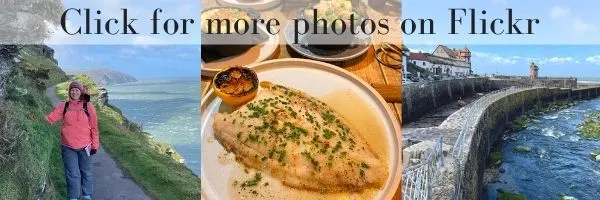The pretty twin villages of Lynton and Lynmouth sit on the rugged north Devon coast, close to the wilds of Exmoor with open sea views.
Lynton sits serenely on top of the cliff, while its sister village Lynmouth offers traditional seaside fun at the river mouth below. The twin villages are connected by a heritage cliff railway.
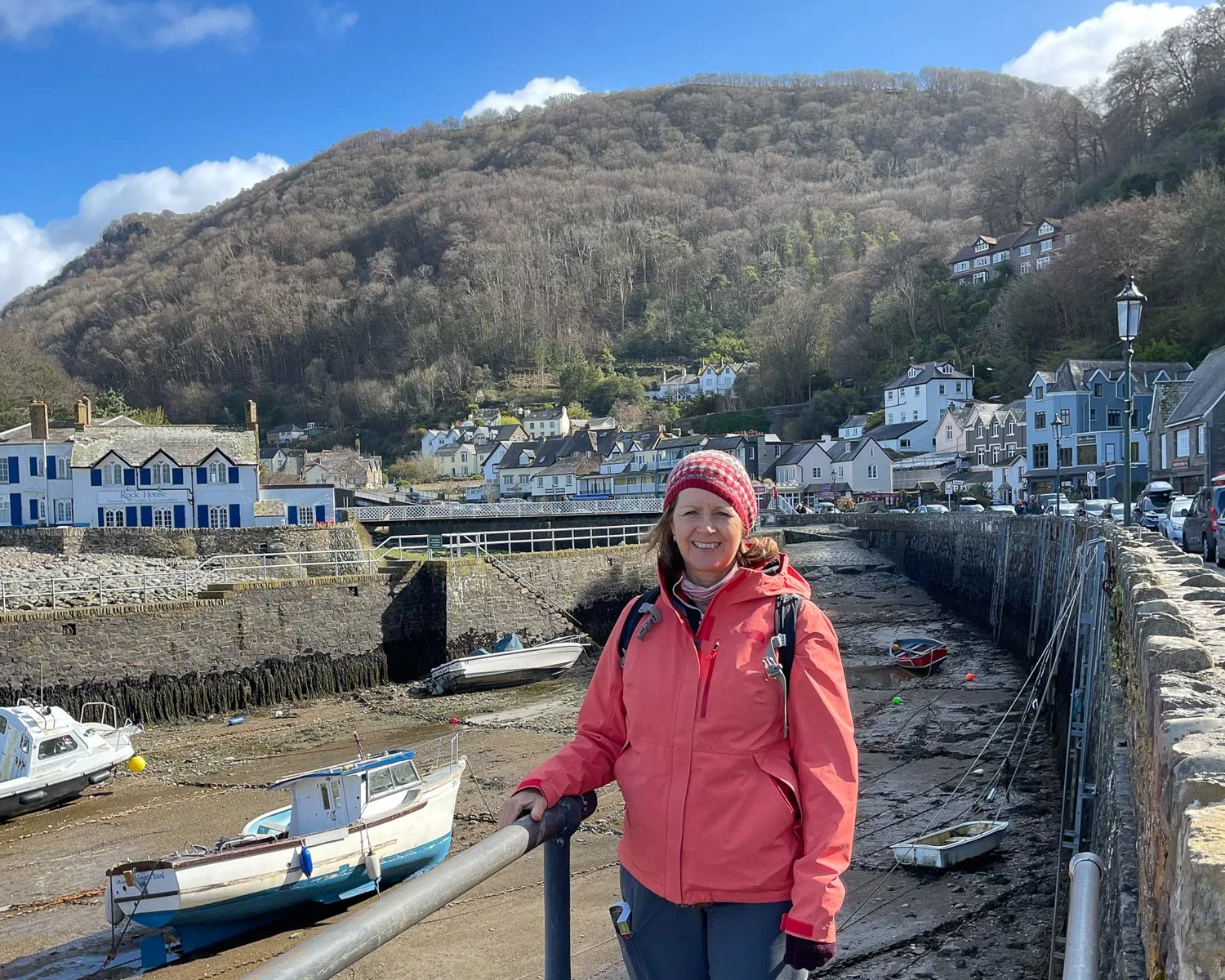
This article may contain affiliate links that provide commission on purchases you make at no extra cost to you. As an Amazon Associate I earn from qualifying purchases.
With plenty of thing to do in Lynton and Lynmouth, this part of Devon makes an ideal short break. Enjoy walking, relaxing and just soaking up the beautiful, unspoiled landscapes.
We stayed at the luxurious Highcliffe House in Lynton, a boutique bed and breakfast with friendly service and stylish decor. This made a comfortable base to explore the area (read my review here).
Top things to do in Lynton Devon
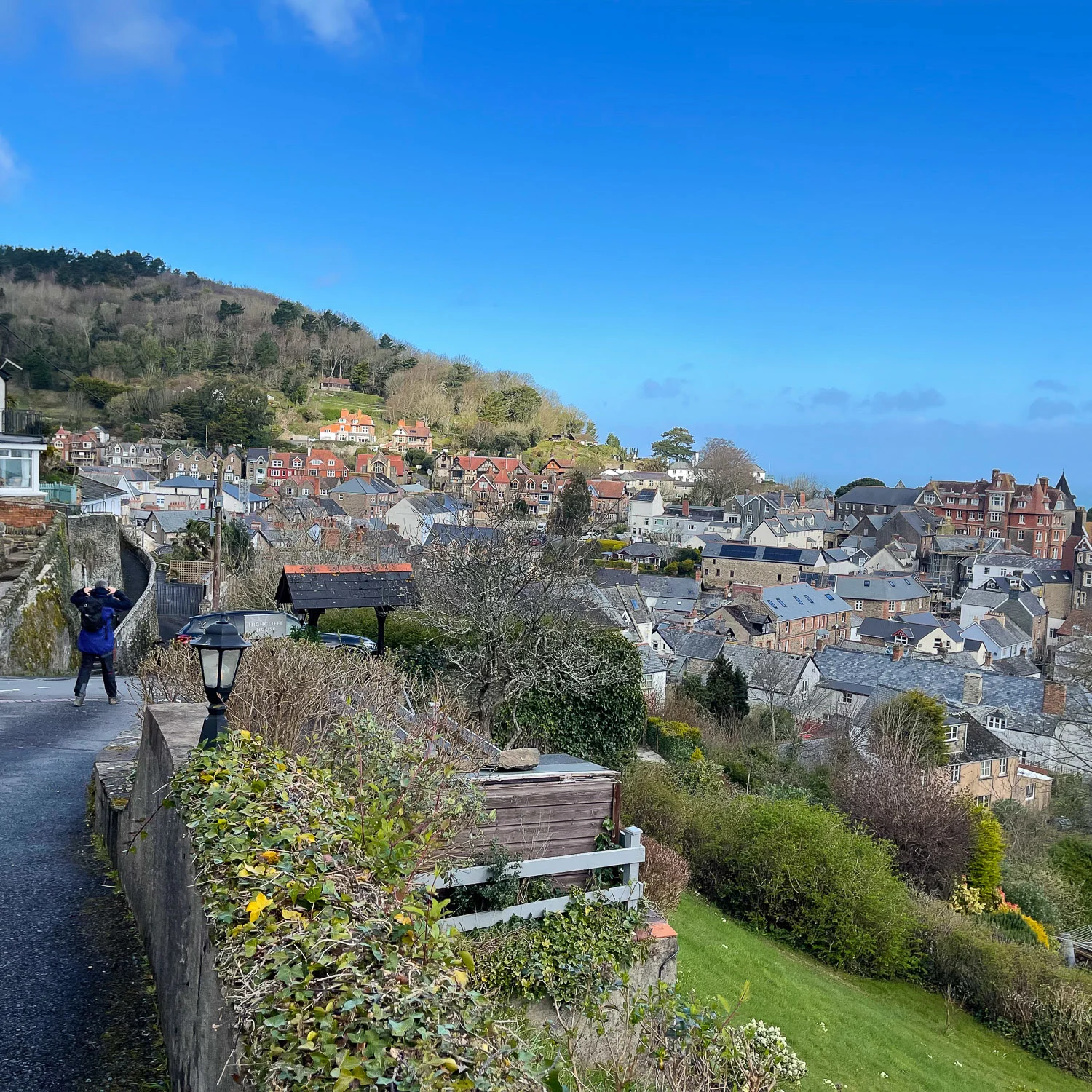
1. Lynton – a wander around town
Since we stayed in Lynton at the luxury guest house Highcliffe House. Our first activity on arrival was to explore the charming streets of this small cliff top town.
There’s a mix of independent shops, places to hunt for antiques, art galleries. You’ll also find cafes scattered through the narrow streets, some of which are pedestrianised.
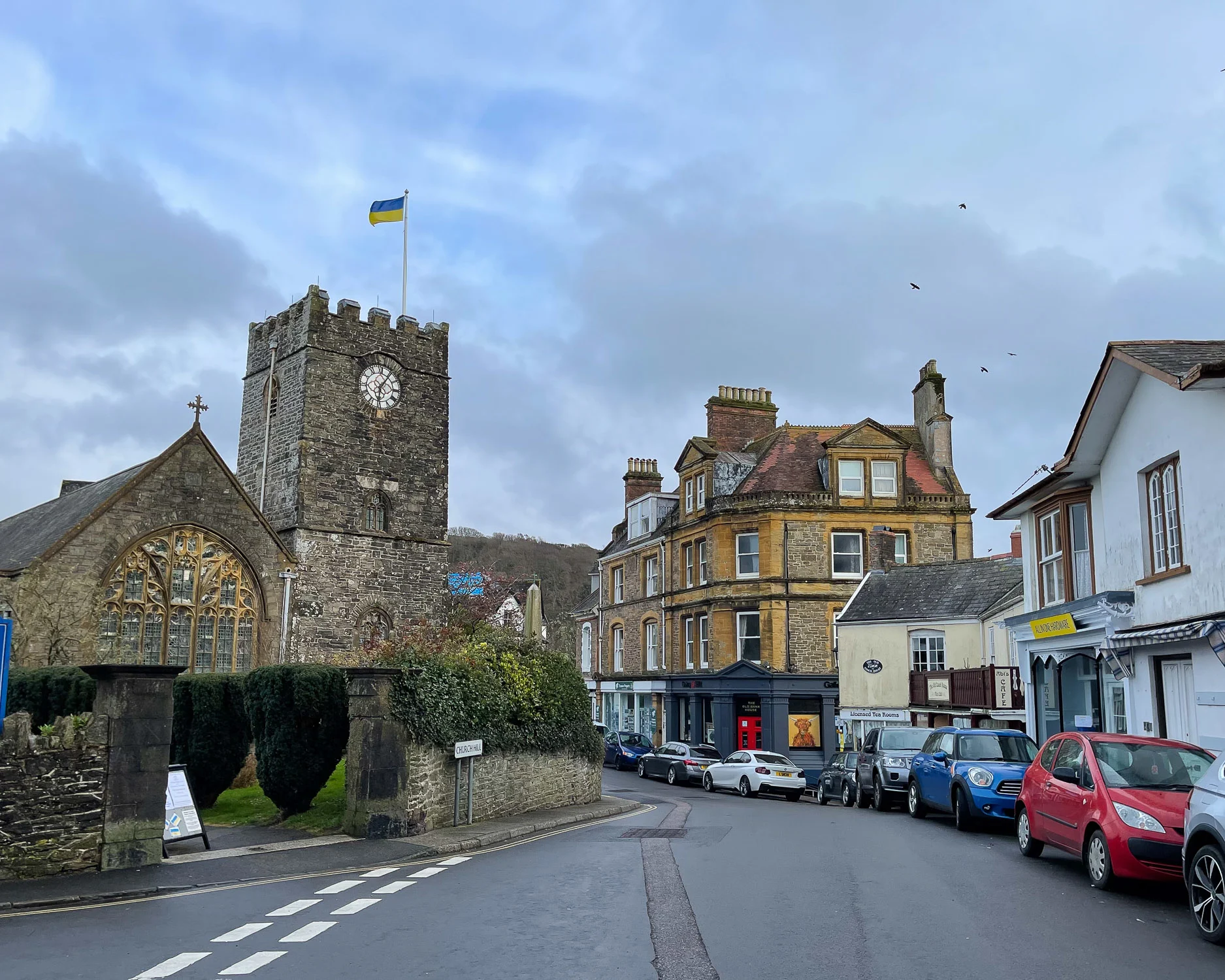
I visited the church of St Mary the Virgin, which is beautiful inside. It has some well placed benches in the graveyard, overlooking the sea and beach of Lynmouth below.
Further up Lee Road, on the way to the Valley of the Rocks, we stopped to admire a huge range of local crafts in the Lyn Valley Art and Craft Centre. It’s located in an old church, with the Lynton cinema tucked down one side of the building.
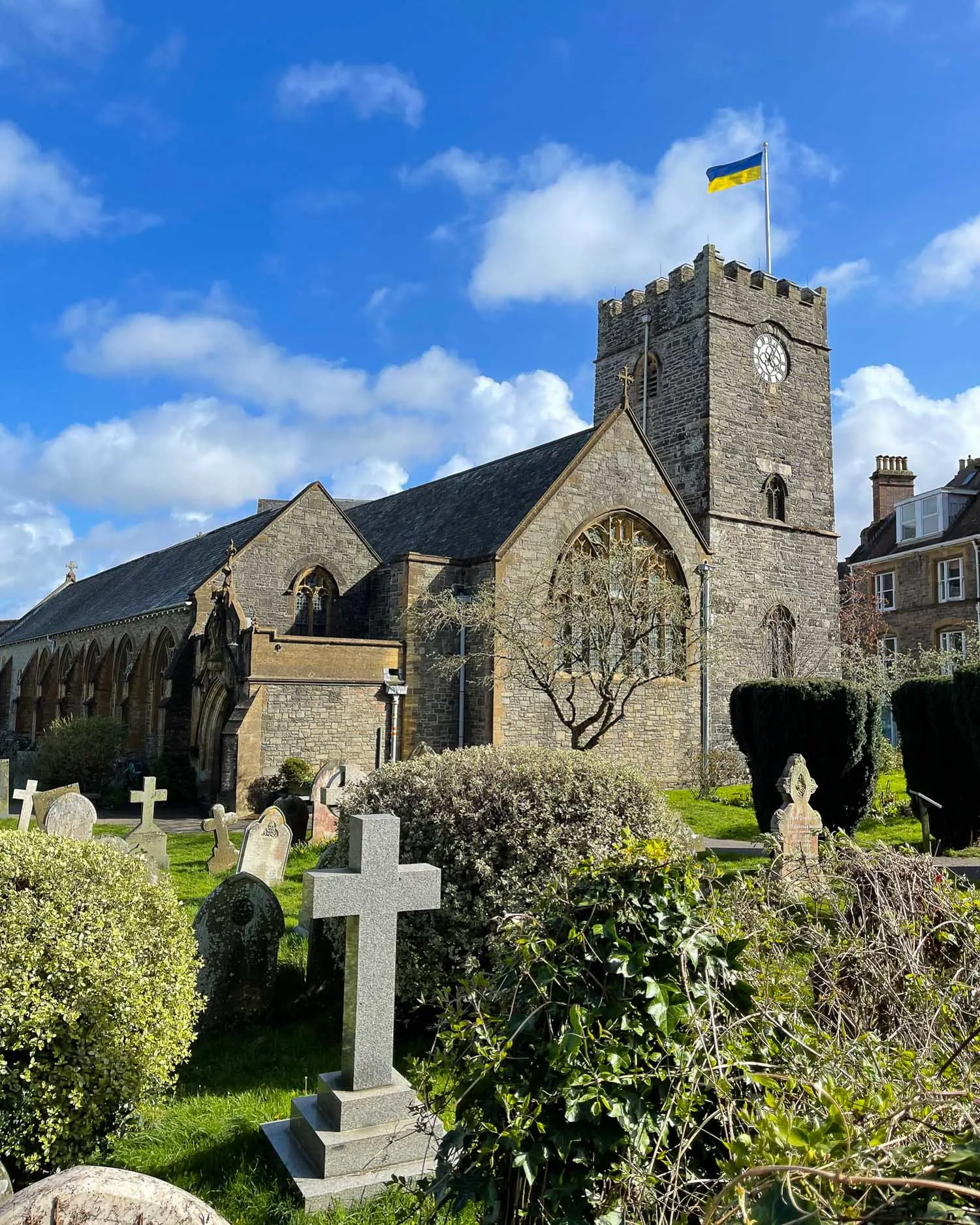
There are numerous ice cream shops, delis and cafes in Lynton, especially clustered around the Lynton and Lynmouth Cliff Railway. Whether you are after a Devon cream tea, or some picnic provisions to take on a walk, you’ll find something delicious to eat. I’ve covered our recommendations for places to eat out in the section at the end of this article.
In a pretty whitewashed cottage is the Lyn and Exmoor Museum, which is the oldest dwelling in Lynton, although it was not yet open for the season. This small museum houses domestic and agricultural tools, as well as artefacts from the towns of Lynton and Lynmouth. There’s also photos from the Lynmouth flood of 1952.
Read about Highcliffe House B&B – a luxury guest house in Lynton, Devon
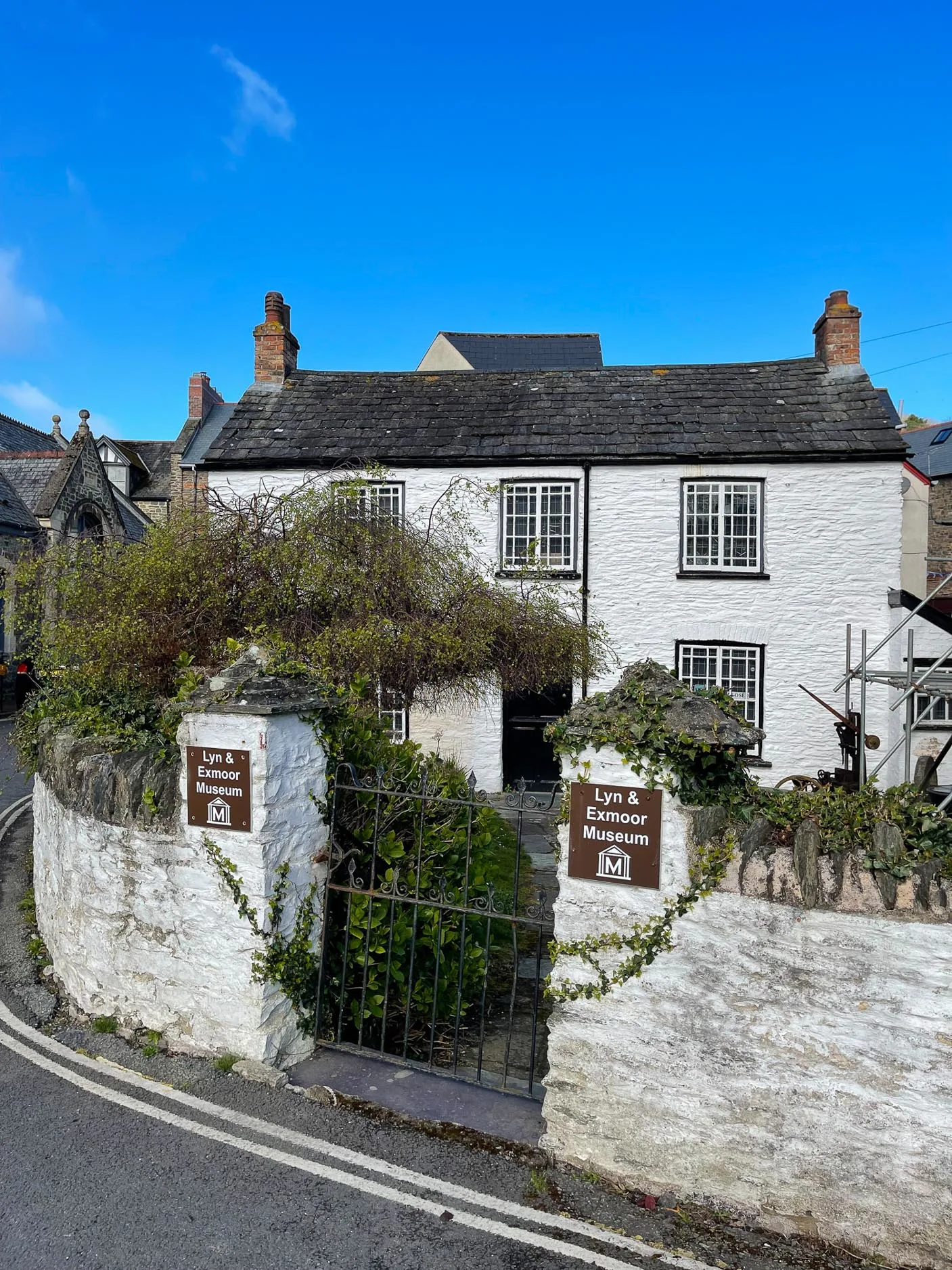
2. Lynton and Lynmouth Cliff Railway
A ride on the Lynton and Lynmouth Cliff Railway is one of the top things to do in Lynton and Lynmouth. In Lynton you’ll find the railway entrance close to the church.
This Victorian water powered funicular opened in 1890. It continues to transport visitors, from Lynton at the top of the cliff down to Lynmouth at the bottom by the sea.
Fully powered by water, the heritage railway is an ingenious feat of Victorian engineering. Water from the Lyn river fills the cars to allow them to descend using only gravity.
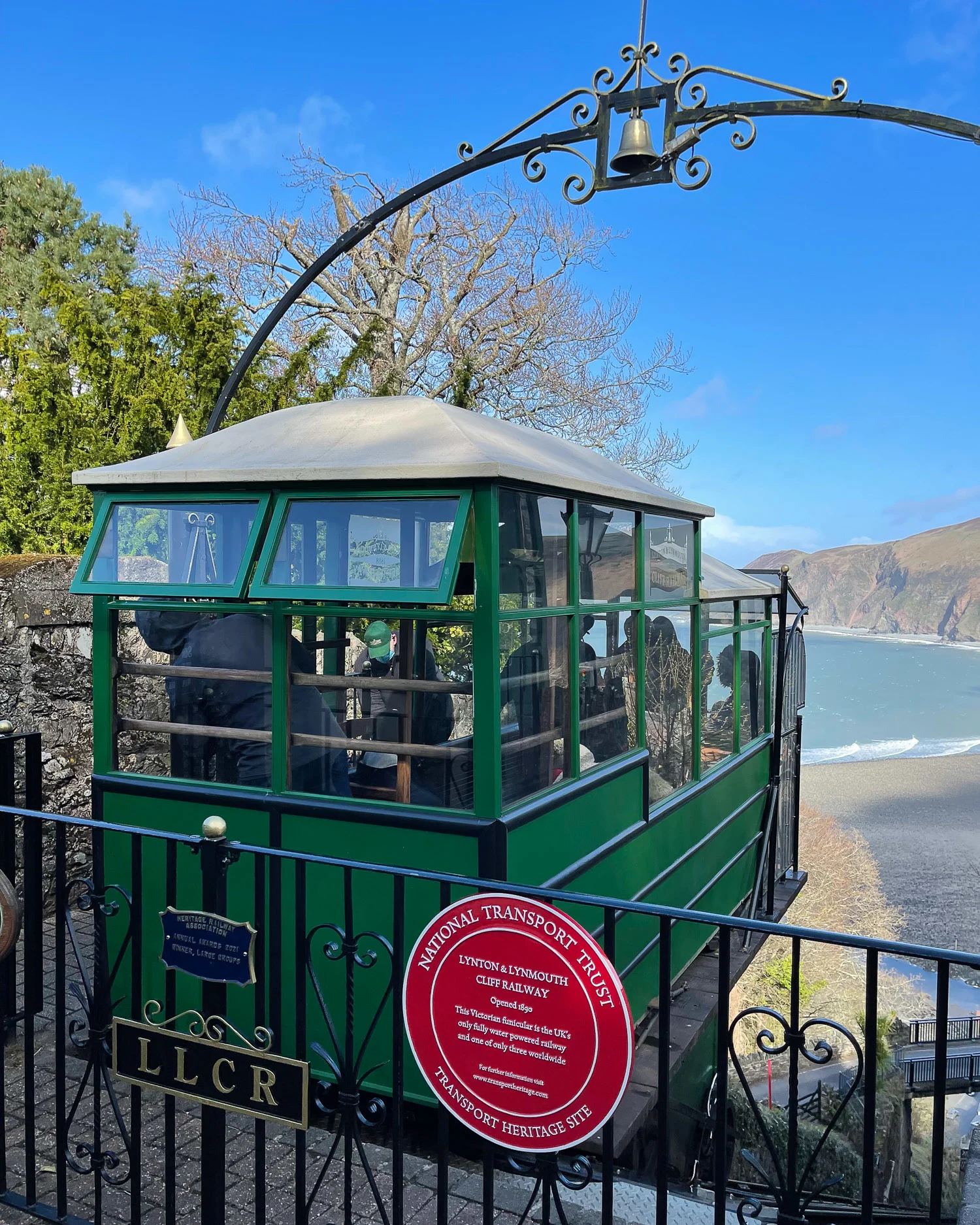
The journey down the steep cliff takes just a few minutes but the views over the sea are thrilling! In the past, pack horses were used to bring supplies up the cliff and as an alternative to the railway.
You can also walk the zig zag path that runs between Lynton and Lynmouth. If you decide to walk it’s fun to watch the cars of the cliff railway going up and down from the two bridges that cross the track.
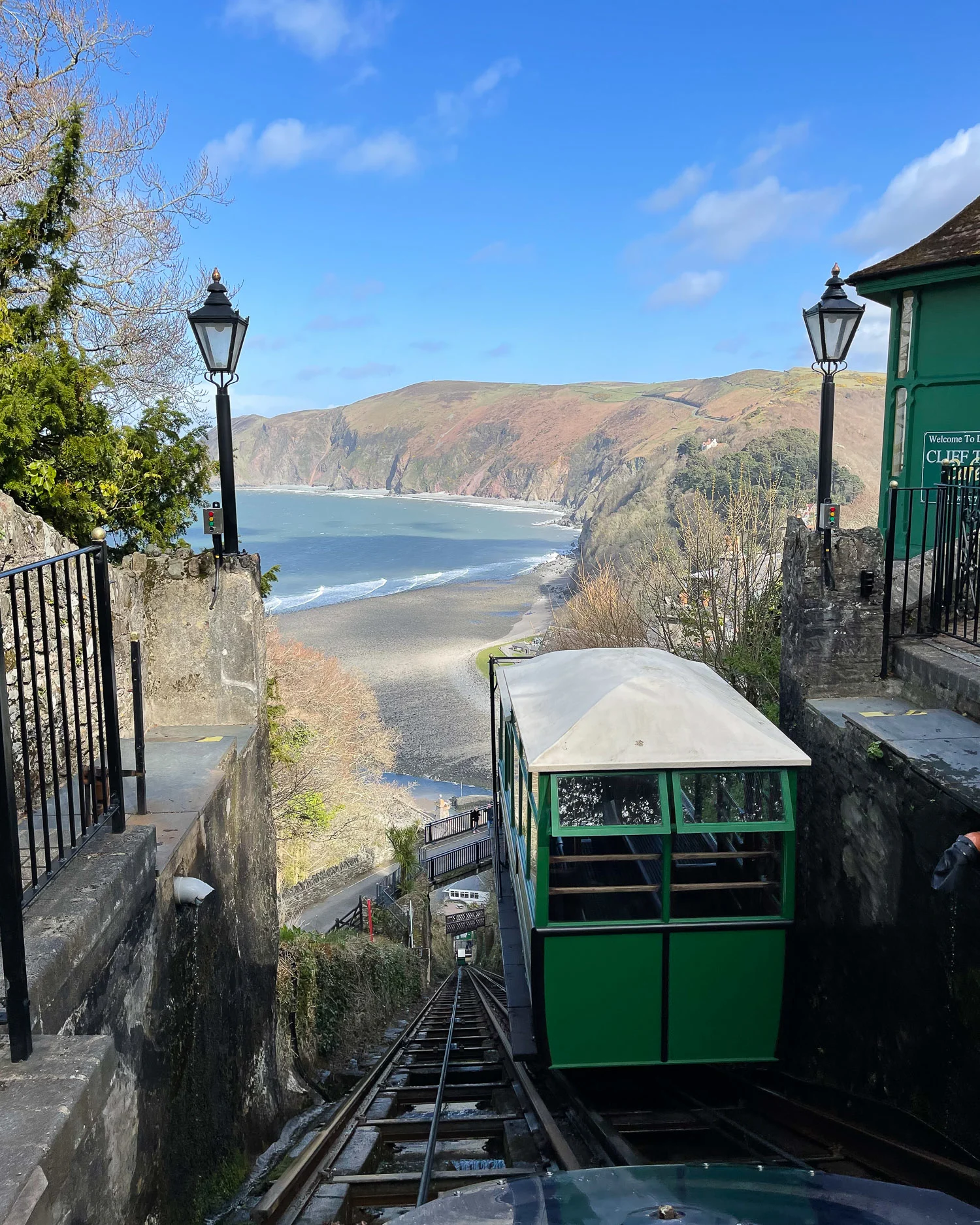
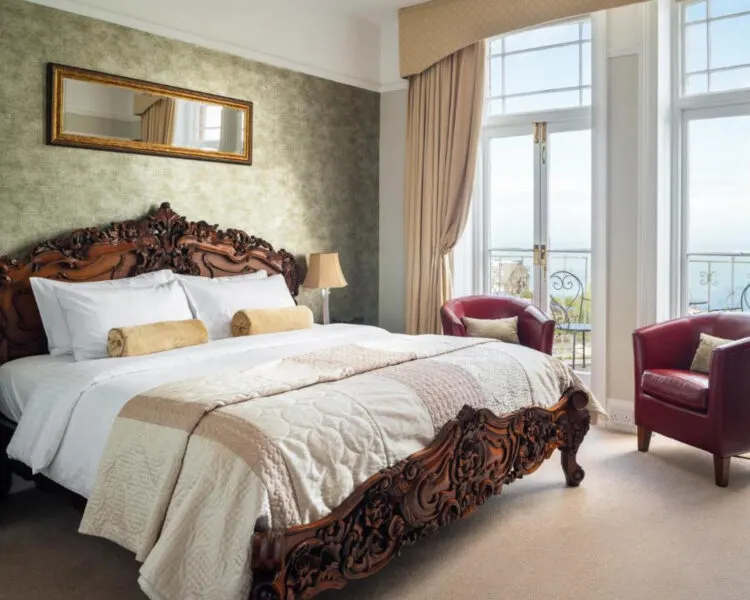
We stayed at Highcliffe House luxury B&B in Lynton, Devon – read my review
3. Valley of the Rocks
Another of the top things to do in Lynton and Lynmouth is a walk through the Valley of the Rocks. It’s a picturesque glacial valley with steep sides, topped with boulders perched on the cliff overlooking the sea.
Clambering up to the top of the rocks, you are likely to meet some of the wild goats that inhabit these clifftops. The South West Coastal Path runs close to the sea below the rocks. It’s a wild walk that runs from Lynmouth to Woody Bay and beyond.
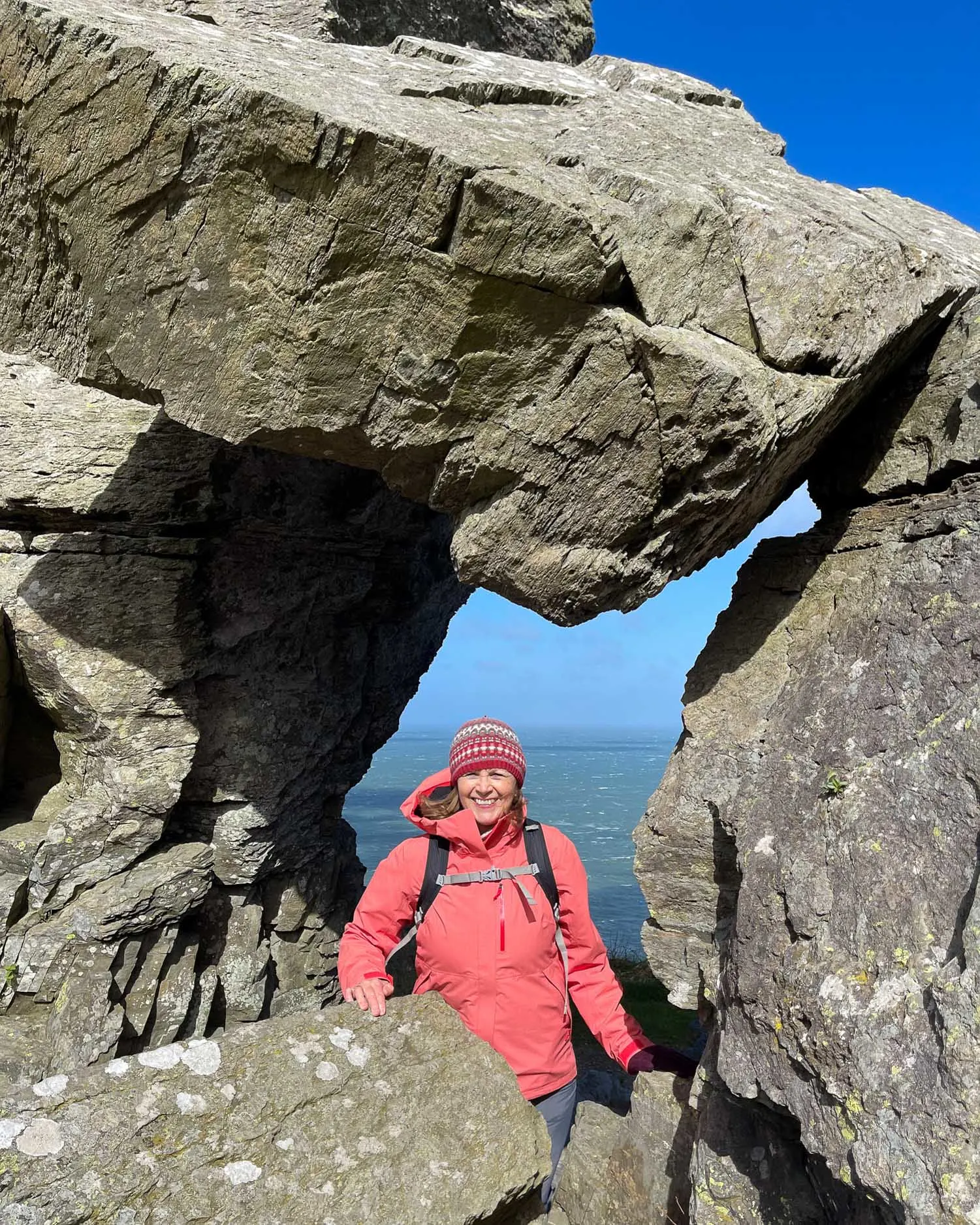
It’s easy to access the Valley of the Rocks from Lynmouth, by following the coastal path. Or, from Lynton follow Lee Road that runs through town until you see signposts.
If you are driving, there is a car park at the entrance to the valley as you approach from Lynton. The cliff path and viewpoints from the top of the rock formations can be windy.
Photographers will find plenty of stunning scenery to capture. You can make a longer walk by continuing from the Valley of the Rocks on the South West Coastal Path to Lee Abbey and beyond.
Read about a weekend in Cornwall at St Michael’s Mount
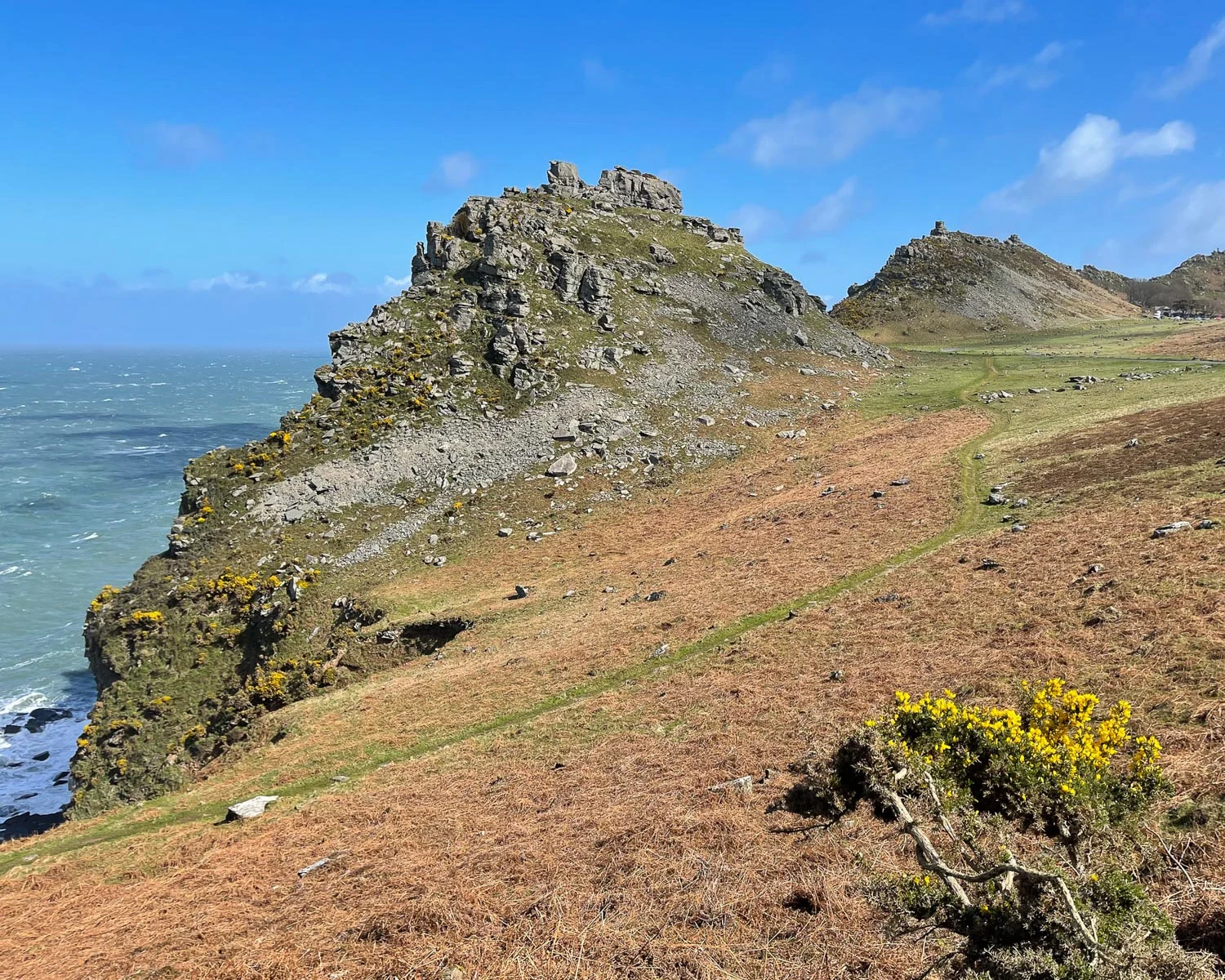
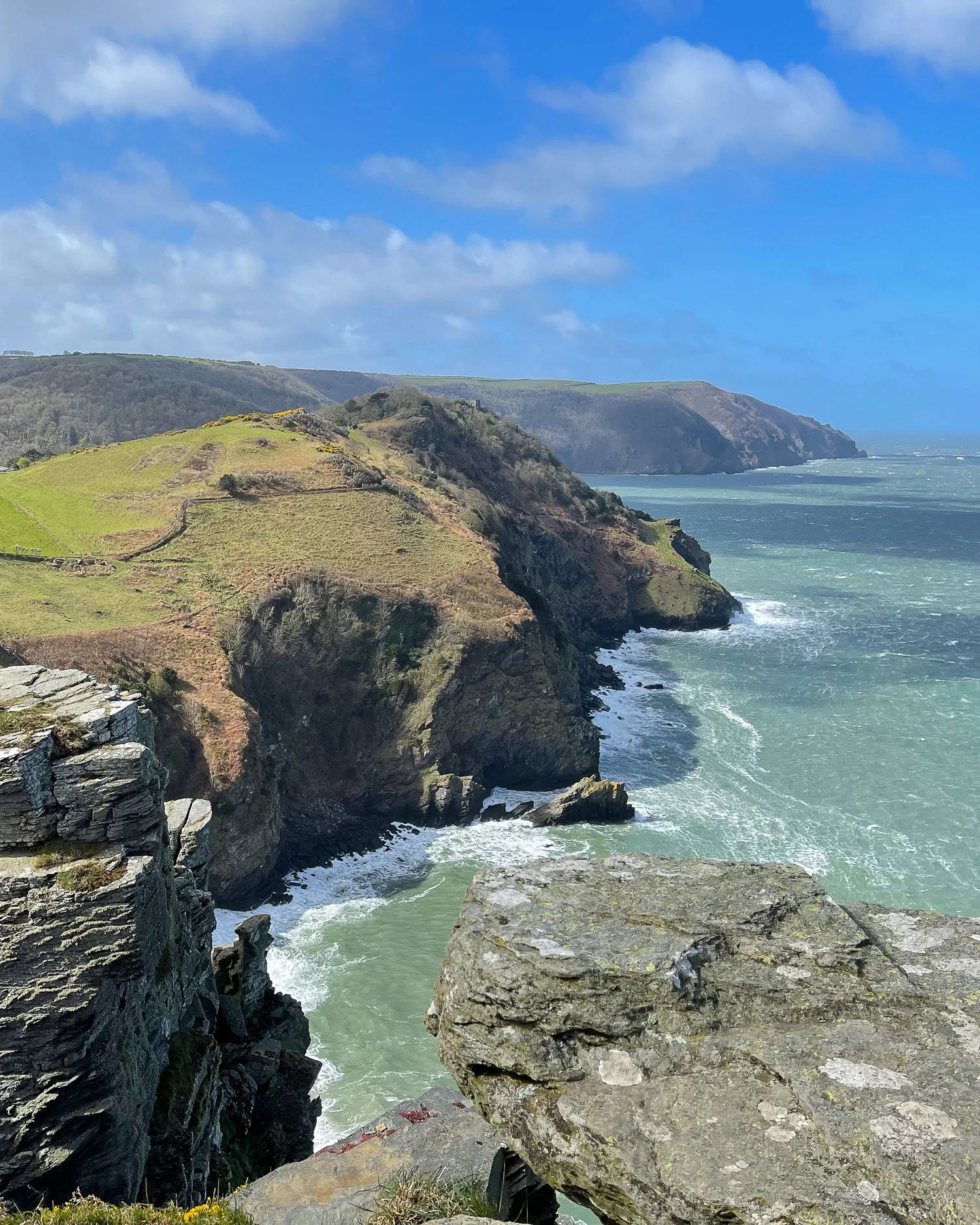
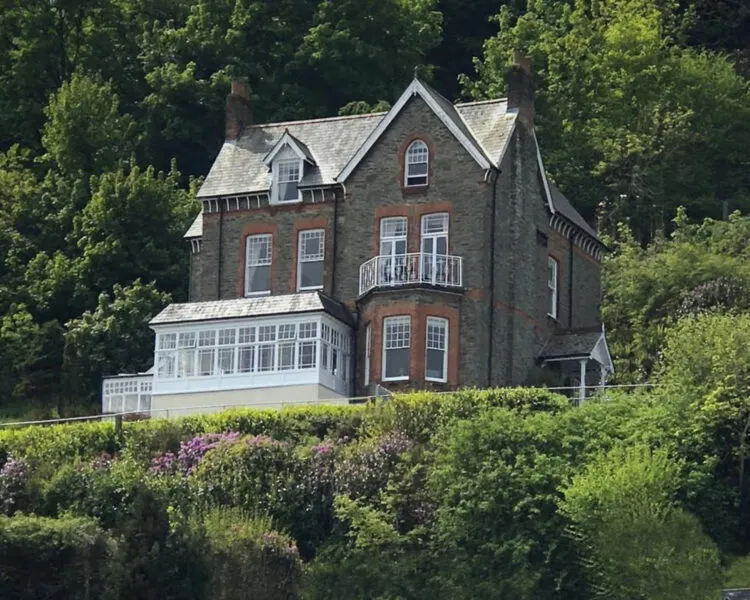
We stayed at Highcliffe House luxury B&B in Lynton, Devon – read my review
Top things to do in Lynmouth Devon
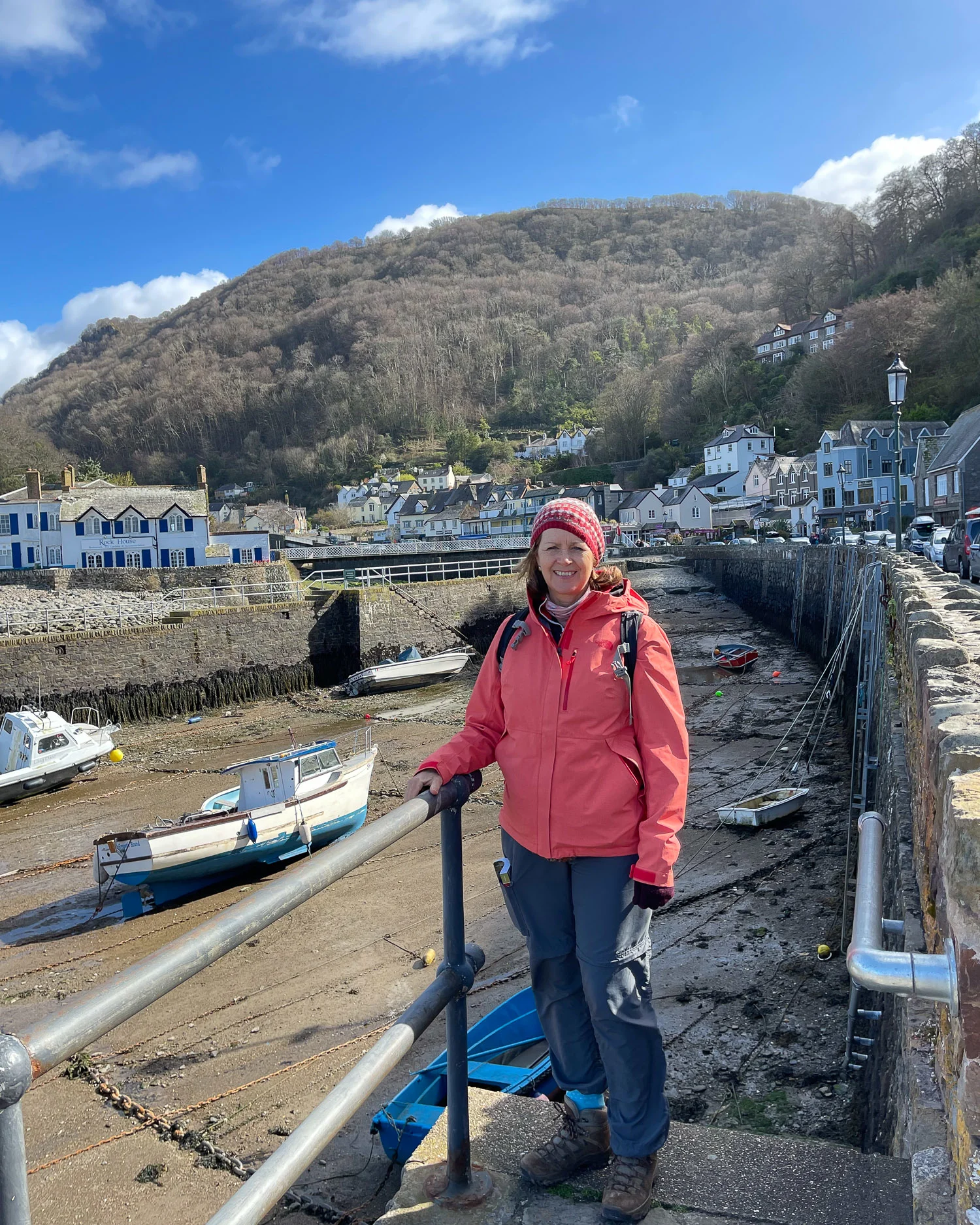
4. Lynmouth – a walk around town
While Lynton at the top of the cliff feels a little more refined, Lynmouth at the bottom offers all the joys of a traditional seaside town. The sheltered main street is full of shops selling fudge, souvenirs and local crafts. There’s a smattering of tea shops, pubs and cafes that cater for the influx of summer visitors.
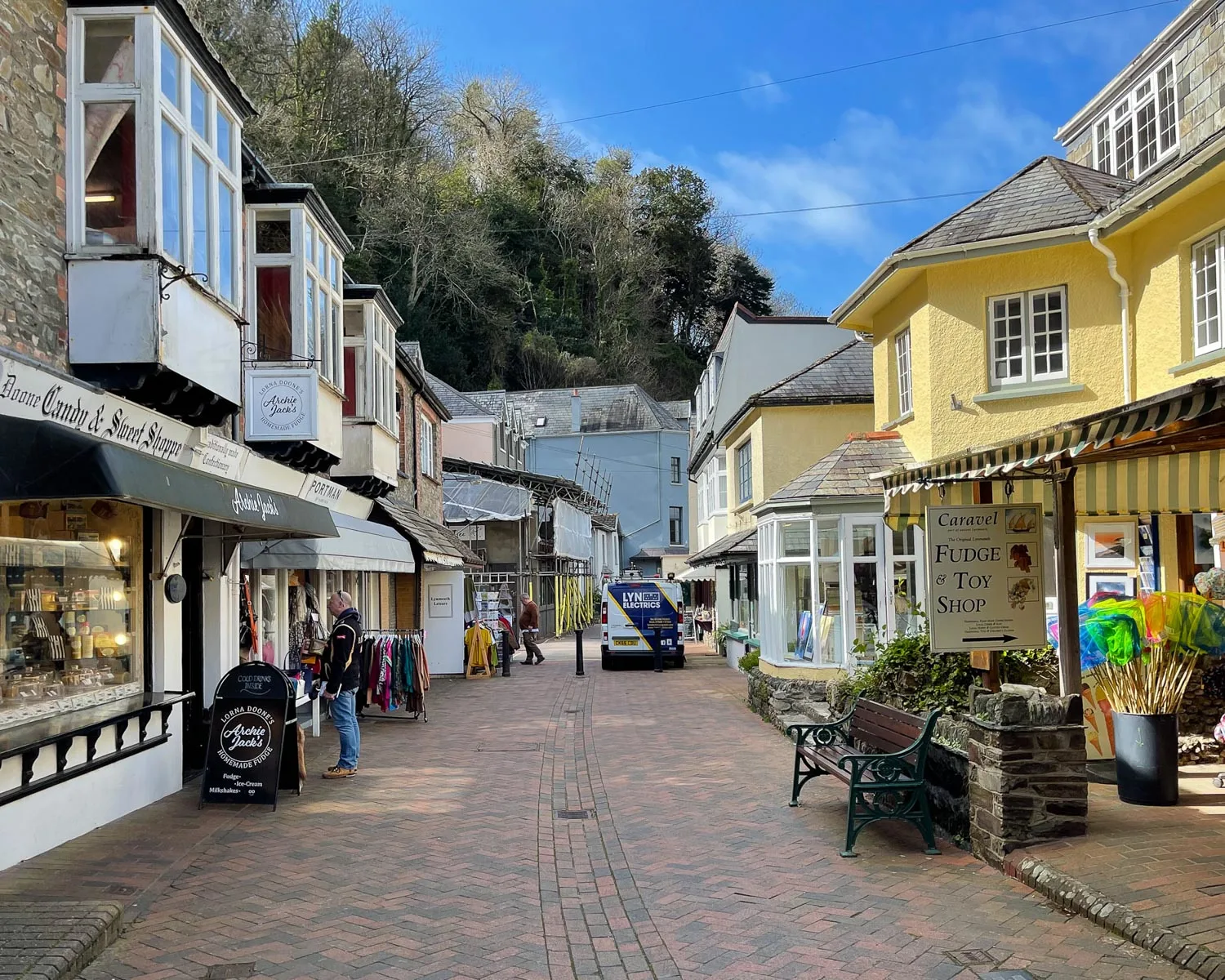
Continuing parallel to the river, you’ll pass the Flood Memorial Hall which I’ve written about below. There’s an exhibition about the tragic flood of 1952 on the upper floor and a lifeboat information shelter at street level.
Where the river meets the sea is the Rhenish tower which was built in the 1850s, serving as a lighthouse to guide sailors into the harbour. It was also a water tank to supply sea water to nearby bath houses, when bathing in sea water was all the fashion.
The original tower was swept away in the 1952 flood, but was rebuilt in 1954 on the same spot. It is a well known Lynmouth landmark.
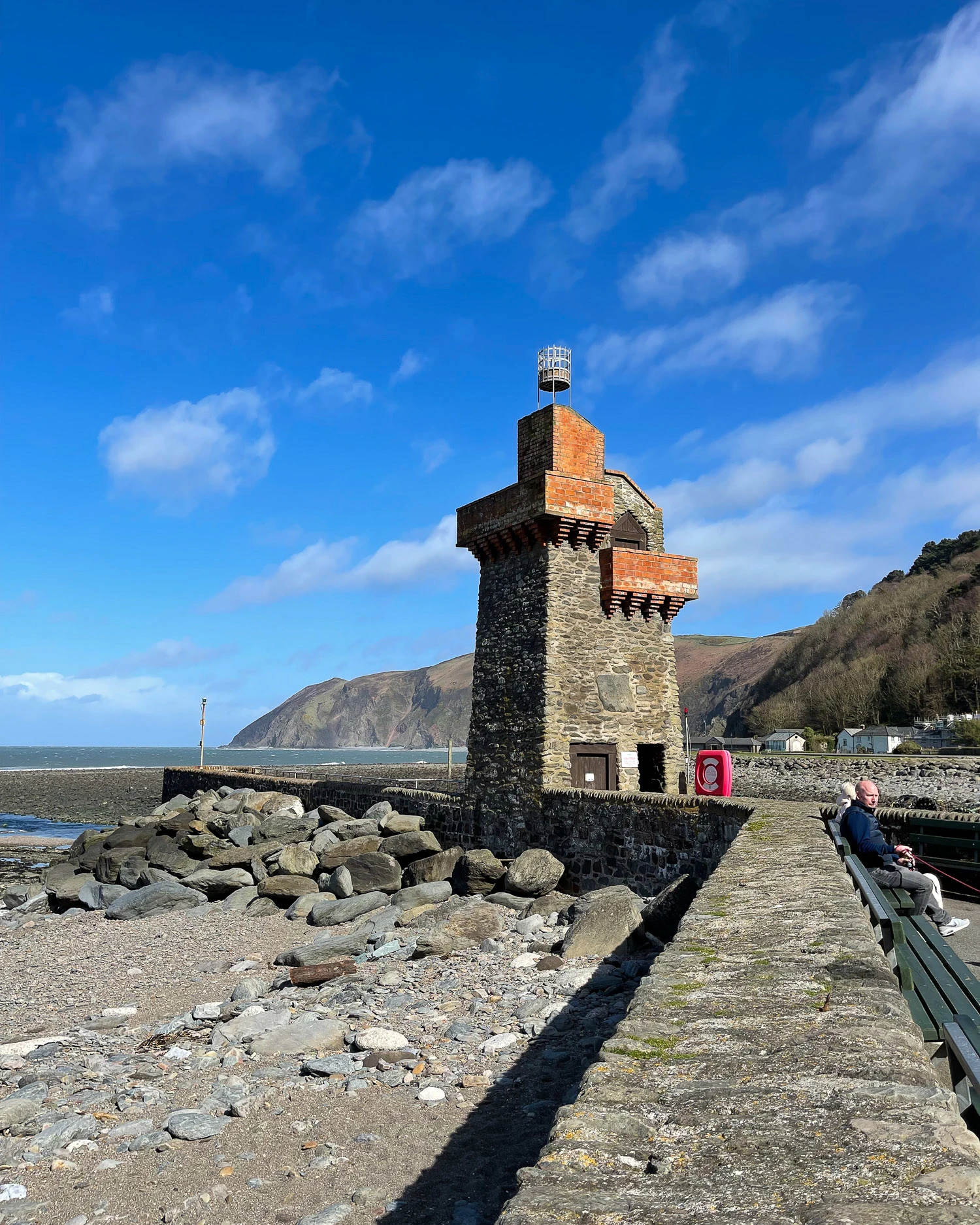
Nearby is the Exmoor National Park centre. Here you’ll find lots of information about walking routes and other things to do in the National Park.
Across the road is a metal sculpture of The Walker by artist Richard Graham. It marks the several long distance walking paths that converge at Lynmouth.
Just beyond the centre is the entrance to the Lynton and Lynmouth Cliff Railway. The railway runs throughout the day to take you back up the cliff to Lynton.
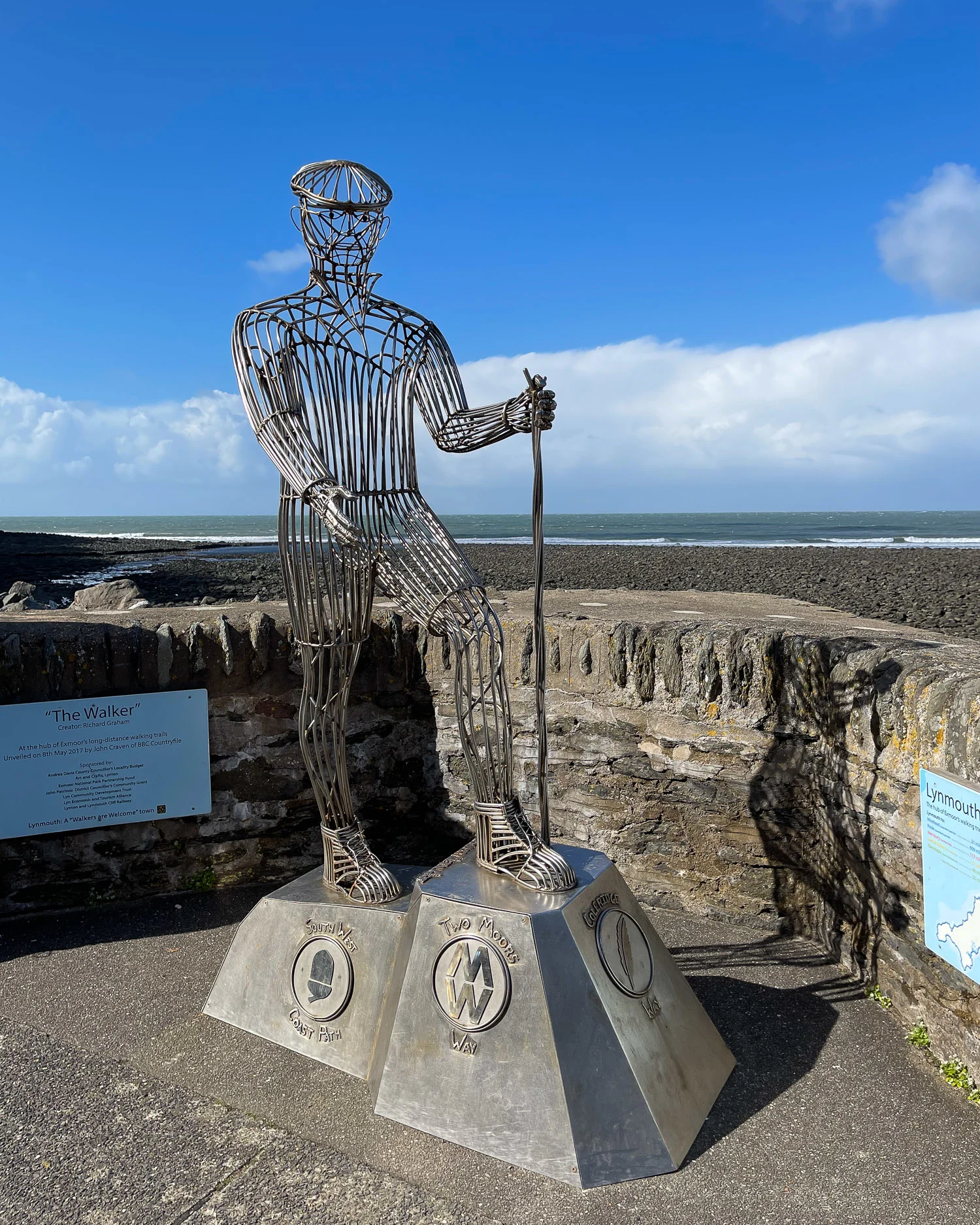
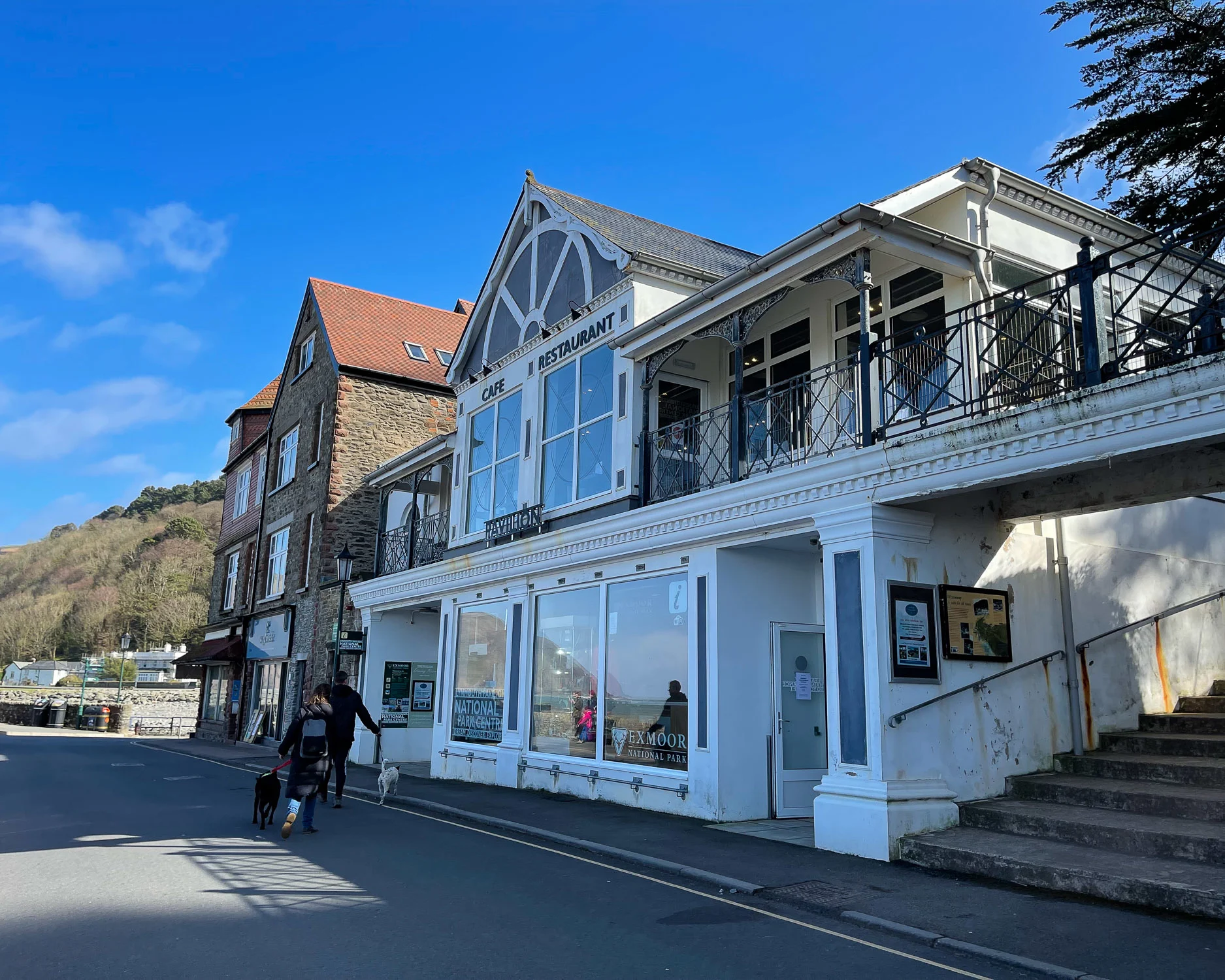
5. Lynmouth – flood memorial exhibition
You won’t be long in Lynmouth before learning about the 1952 flood disaster that destroyed much of the town and made a huge impact on the whole community. On the upper floor of the Lynmouth Flood Memorial Hall is a small exhibition. Learn about the disaster from photographs and accounts from the time; it is well worth a visit.
During the night of 15 August 1952 the West Lyn River rose 60 feet, carrying boulders and debris down the valley in a torrent that swept through the town’s main street. Many of the houses along the river bank were destroyed by the flood. That night 34 people lost their lives, 24 of them in the Lynmouth area.
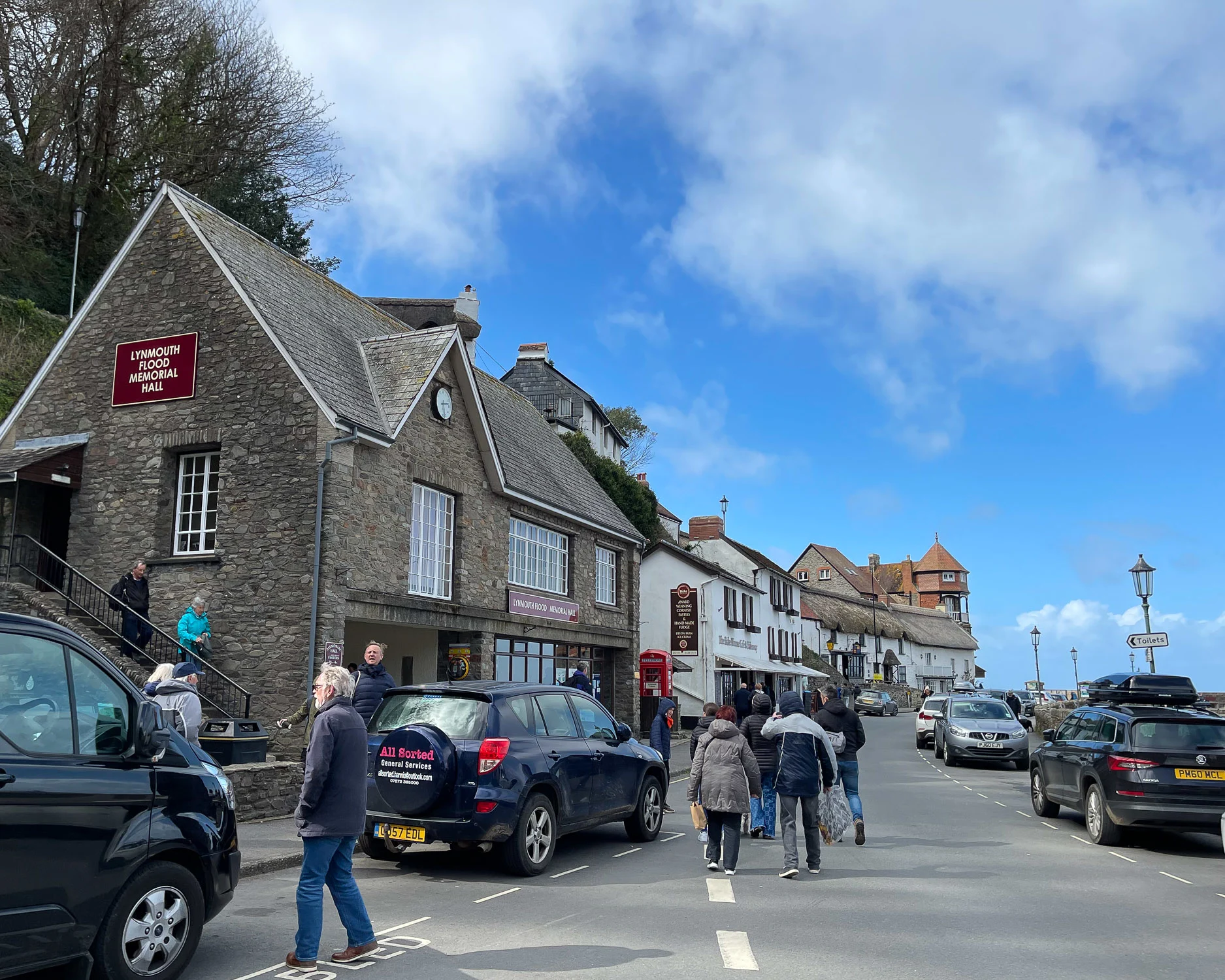
The flood was caused by heavy rain that had fallen during the previous two weeks and another spell of torrential rain with 9 inches falling on the day of the flood. The streams and rivers flowing through the narrow Exmoor valleys could not contain the flow of water.
The situation was exacerbated by the narrow channel through Lynmouth and the houses built in Victorian times on both river banks. Following the devastating flood it took six years to rebuild Lynmouth. The river channel was widened with an overflow area to prevent a similar flood happening in the future.
Read about Warner Leisure Hotels Cricket St Thomas – leisure breaks for the 50+ traveller
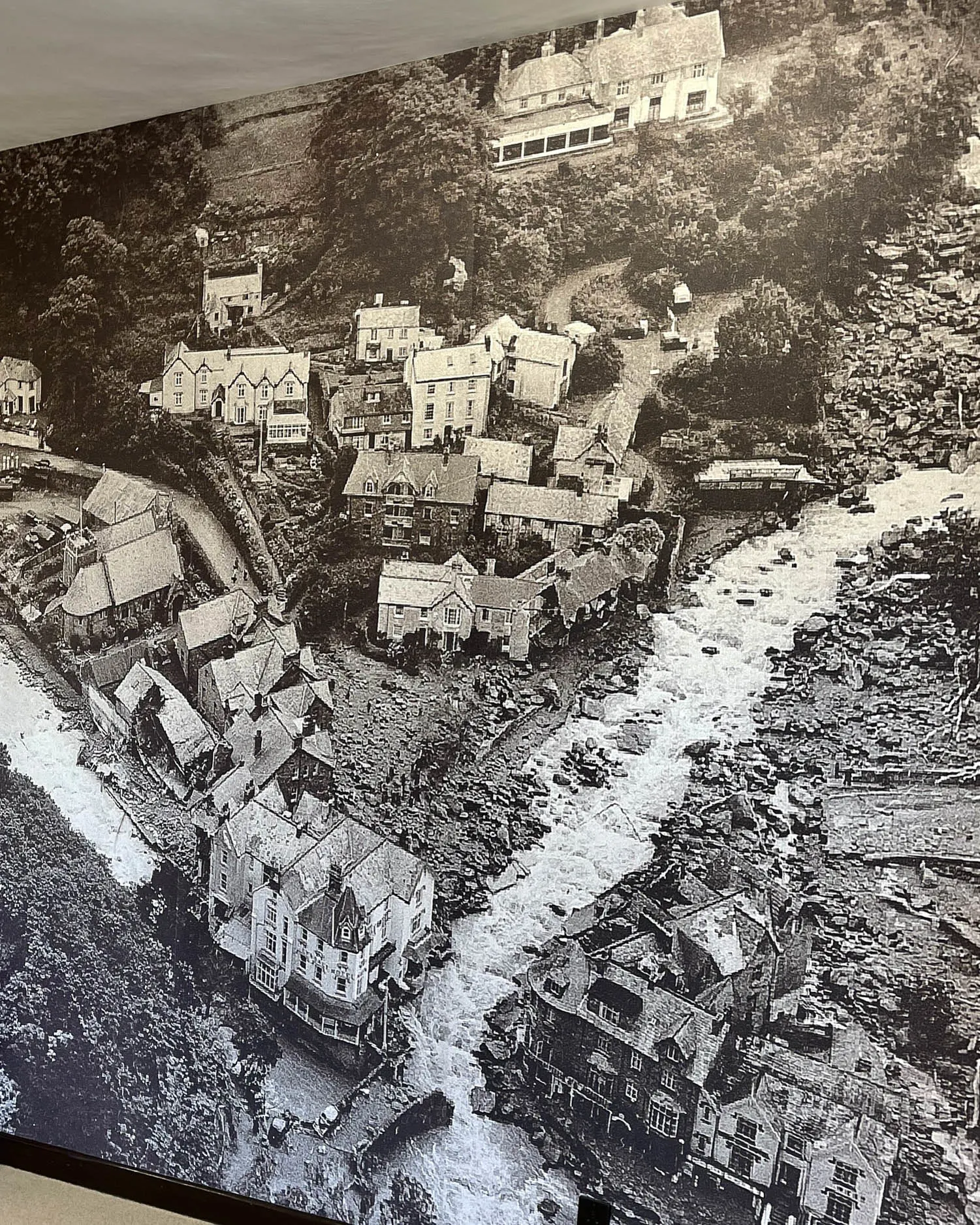
Lynmouth lifeboat service
The Lynmouth Flood Memorial Hall is located in the former lifeboat station. The ground floor has an interesting series of information boards about the Lifeboat service in Lynmouth, which operated until 1944.
The most famous rescue was that of the ship Forrest Hall in 1899 which got into trouble close to Lynmouth. When the storm prevented a rescue launch from Lynmouth, the town leapt into action.
In a heroic effort 20 men and horses dragged the 10 ton lifeboat Louisa over the hill to Porlock Weir. The lifeboat was then launched to go to the assistance of the stranded ship’s crew.
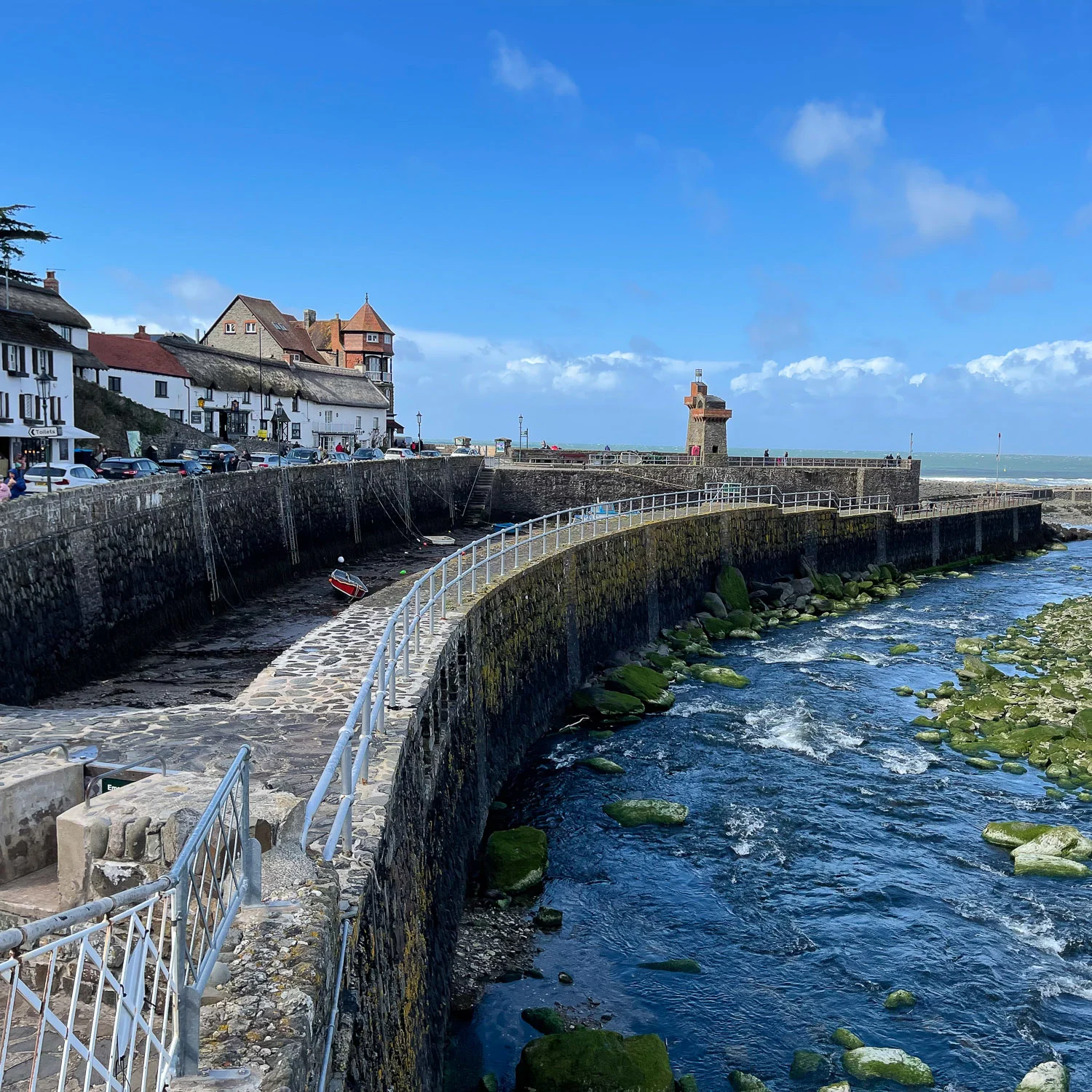
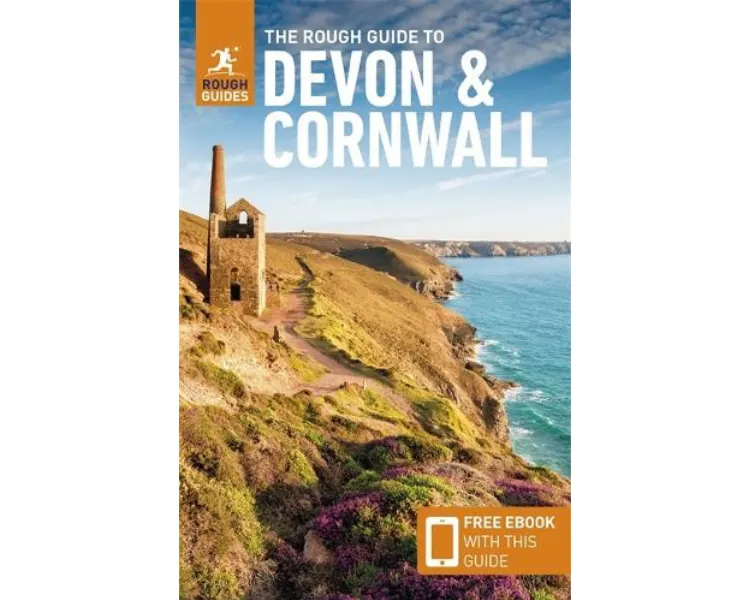
Need a guidebook for Devon? We recommend the Rough Guide to Devon and Cornwall
6. Lynmouth – the beaches and Manor Gardens
While there are two beaches on either side of the harbour at Lynmouth, they are covered with boulders and not ideal for swimming, or even walking. However, a walk through the Manor Gardens brings you to Sillery Beach. This pebble beach has some sand at low tide that’s a little more suitable for swimming in summer, although you need to take care of the tides.
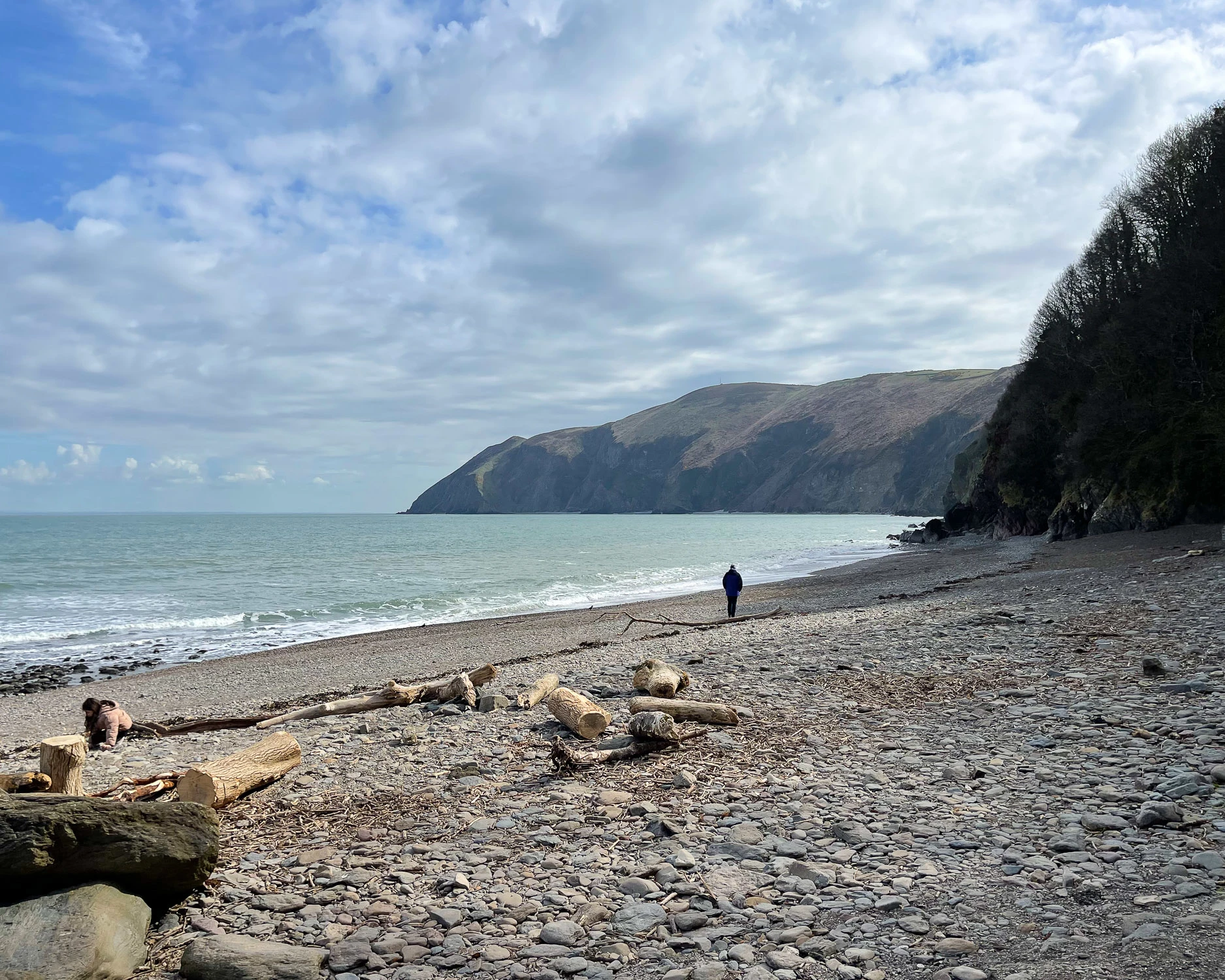
A little further around the headland is Sillery Sands. This beach is currently inaccessible from the coastal path since the steps have been washed away. From Sillery beach you can follow the path up the hill to join the South West coastal path heading east along the ridge of Countibury Hill that overlooks Lynmouth.
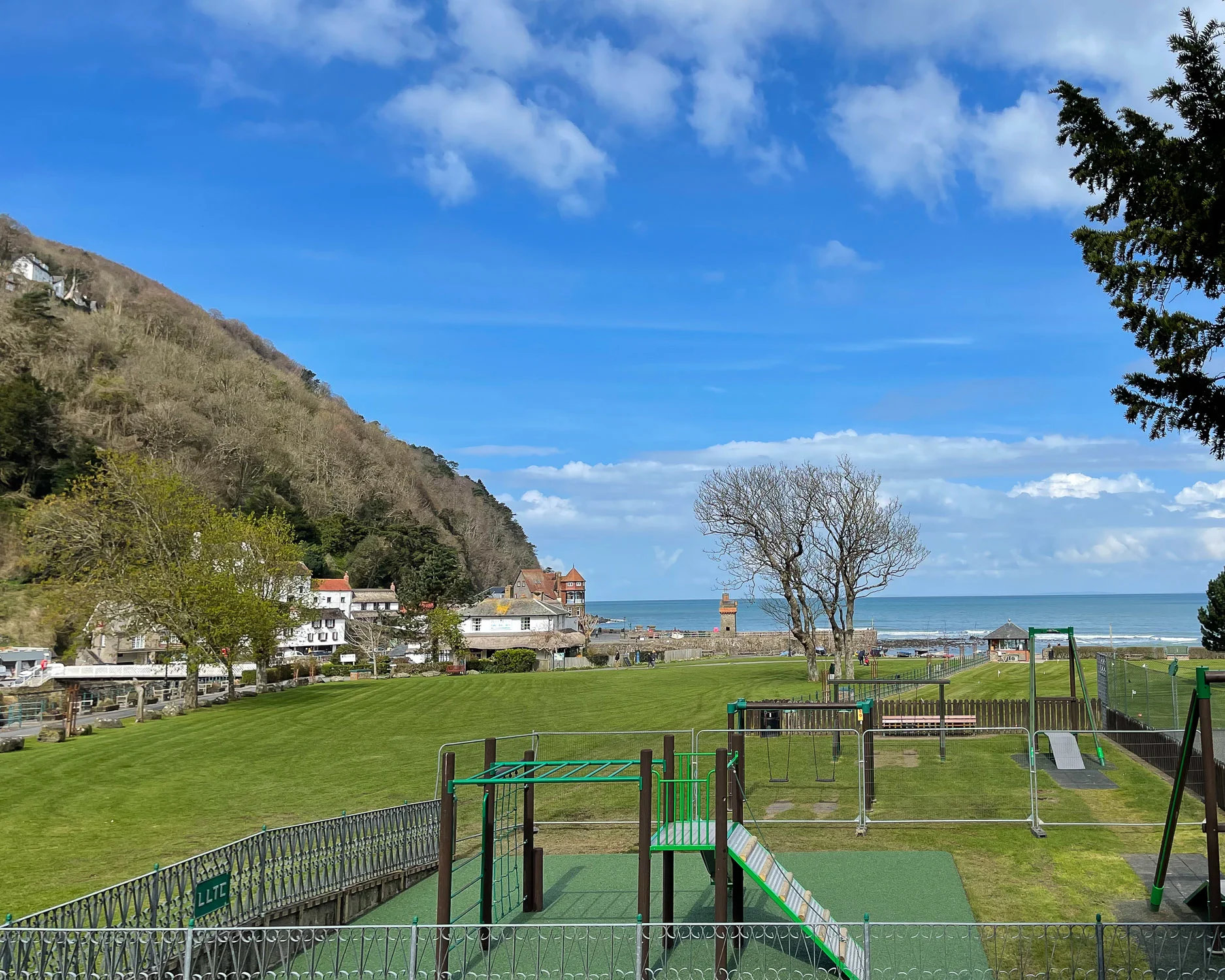
The flat, grassy space of Manor Gardens on the east side of the river is a pleasant recreation area, with views of the old Manor House. It is easily accessed by crossing the footbridge.
Here you’ll find The Rock House tea room in a pretty thatched building, with a mini golf course, tennis court and children’s playground with a flat path leading to Sillery beach.

We stayed at Highcliffe House luxury B&B in Lynton, Devon – read my review
7. Glen Lyn Gorge exhibition
Close to the road bridge into Lynmouth is the Glen Lyn Gorge attraction. There’s an interesting exhibition about the Power of Water based on the hydroelectric energy generated by the river. This family run attraction has a small museum dedicated to local events in Lynmouth.
Learn about the flood disaster of 1952, the lifeboat rescue of Forrest Hill in 1899 and the beached whale that was found in Lynmouth. It also focusses on the role of nature and climate change to shape our future and their influence on catastrophic events such as the flood.
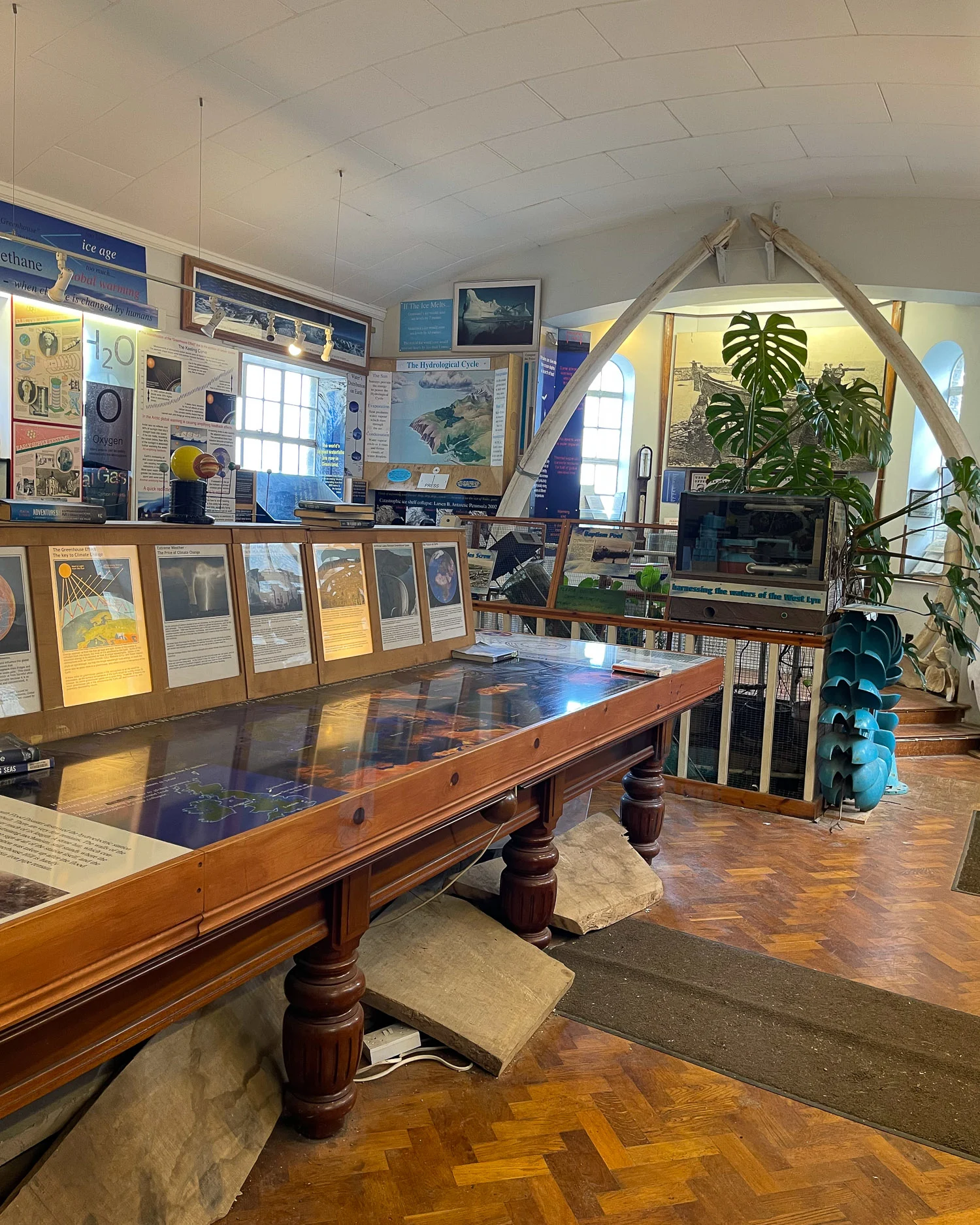
A little beyond the museum you’ll watch water jets shooting into the air in rainbow droplets. You can see the wheels and turbines that are used to provide hydroelectric power to the local area. A walk further up stream brings you to cascades and waterfalls as well as the marker high above the river showing the level of the 1952 flood.
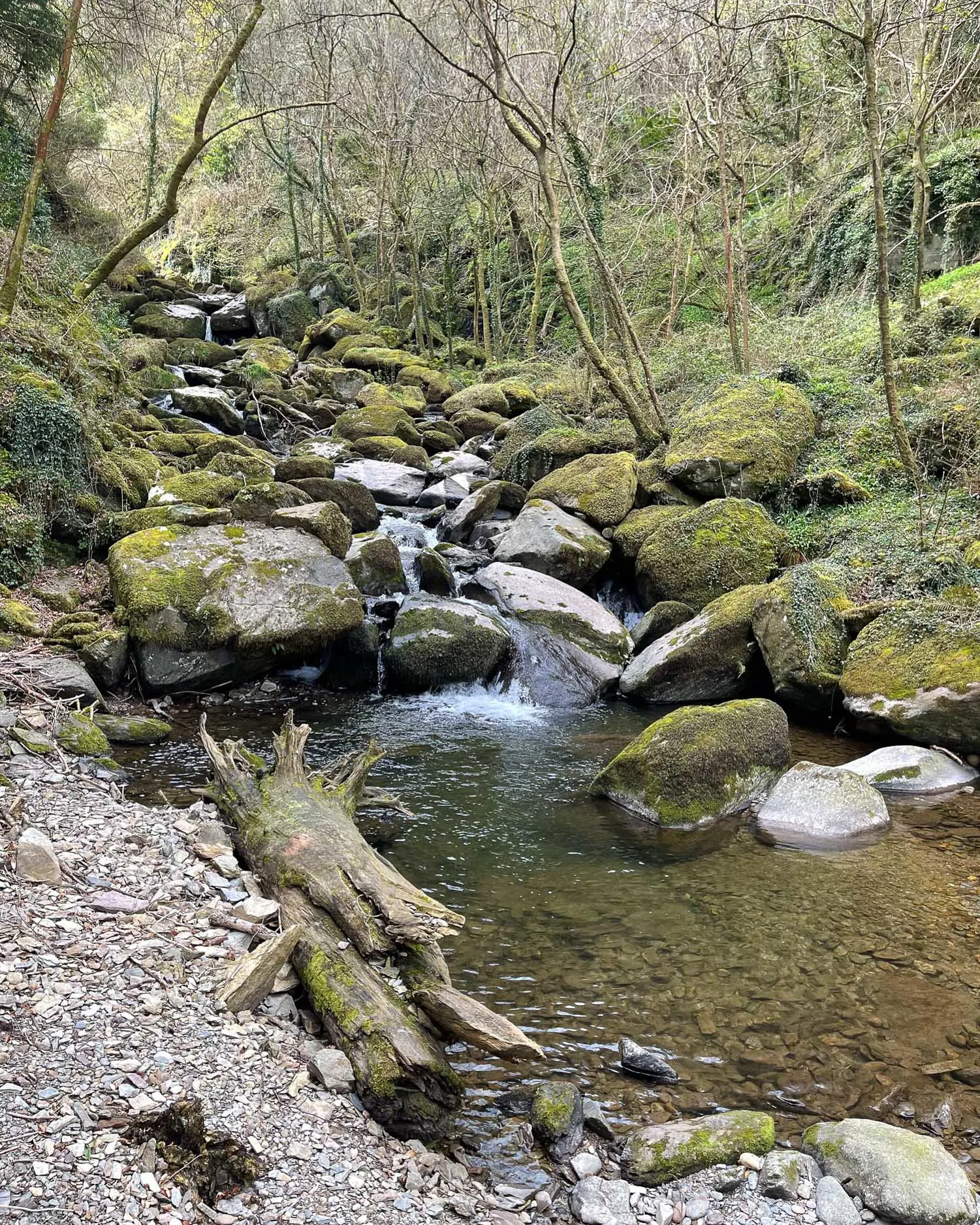
8. Lynmouth – coastal boat trips
During the summer season Exmoor boat trips along the coast are available, run by the same family that own the Glen Lyn Gorge estate. Look out for the sign on Lynmouth Quay with information about sailing times and booking, or contact the Glen Lyn Gorge.
The boat trips run along the coast towards Woody Bay. Enjoy views of the high sea cliffs that are nesting sites for sea birds and river gorges of Exmoor. Hear the stories of the paddle steamers and ruined pier from Victorian times when Lynmouth was a popular seaside holiday spot.
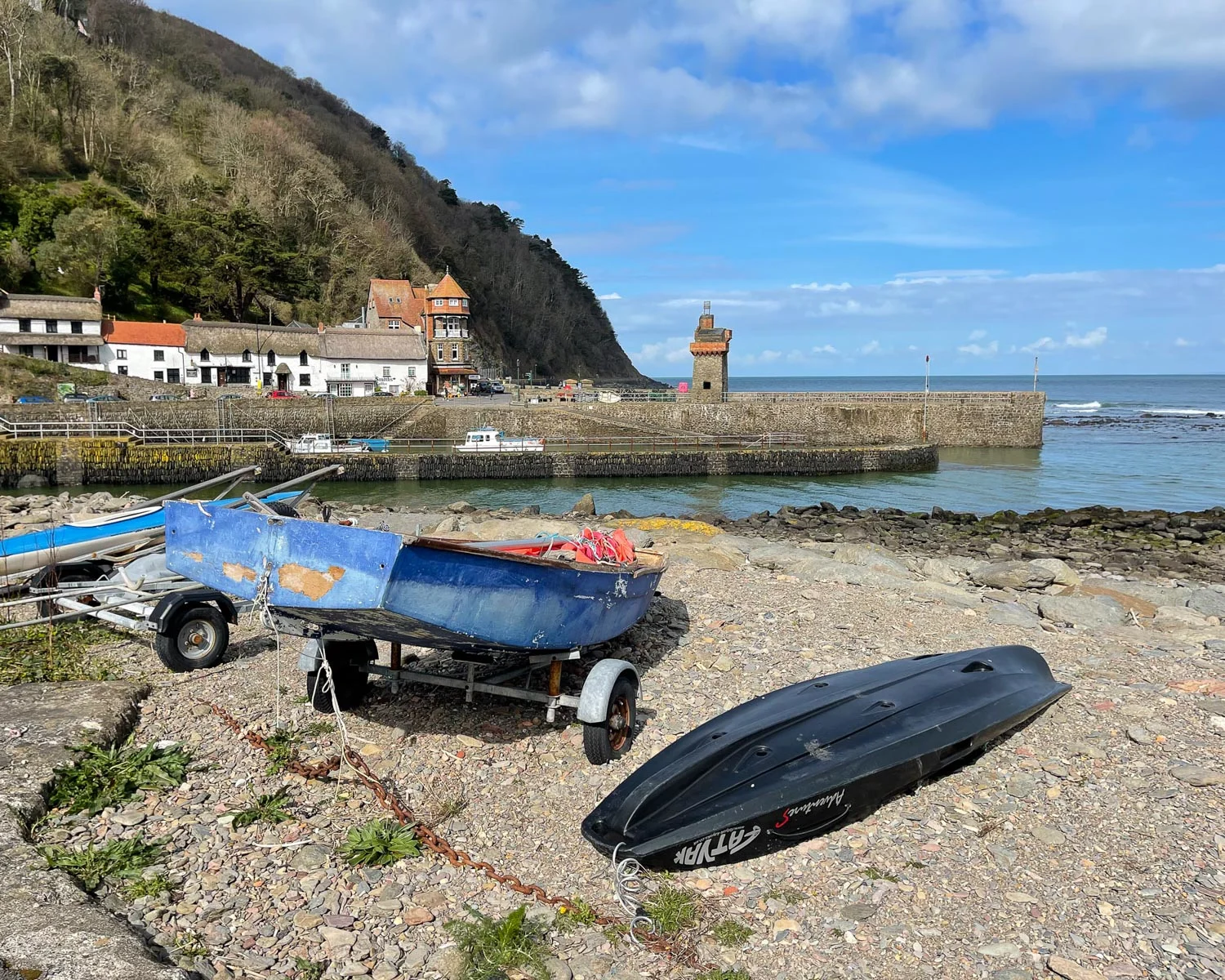
Walking around Lynton and Lynmouth
Situated on the edge of Exmoor, Lynton and Lynmouth are ideally located for walking, There’s access to beautiful coastal scenery and mossy Exmoor river gorges.
9. South West Coastal Path
The South West coastal path runs along the north coast of Devon and passes through Lynmouth. It skirts around the whole coast of Devon and Cornwall and ending near Poole in Dorset.
The stretch from Lynmouth, through the Valley of the Rocks and on to Woody Bay is especially stunning, running close to the sea. At the Valley of the Rocks, you can meet the feral goats and scramble up the rocky outcrops pushed to the edge of the cliff by a glacier millions of years ago.
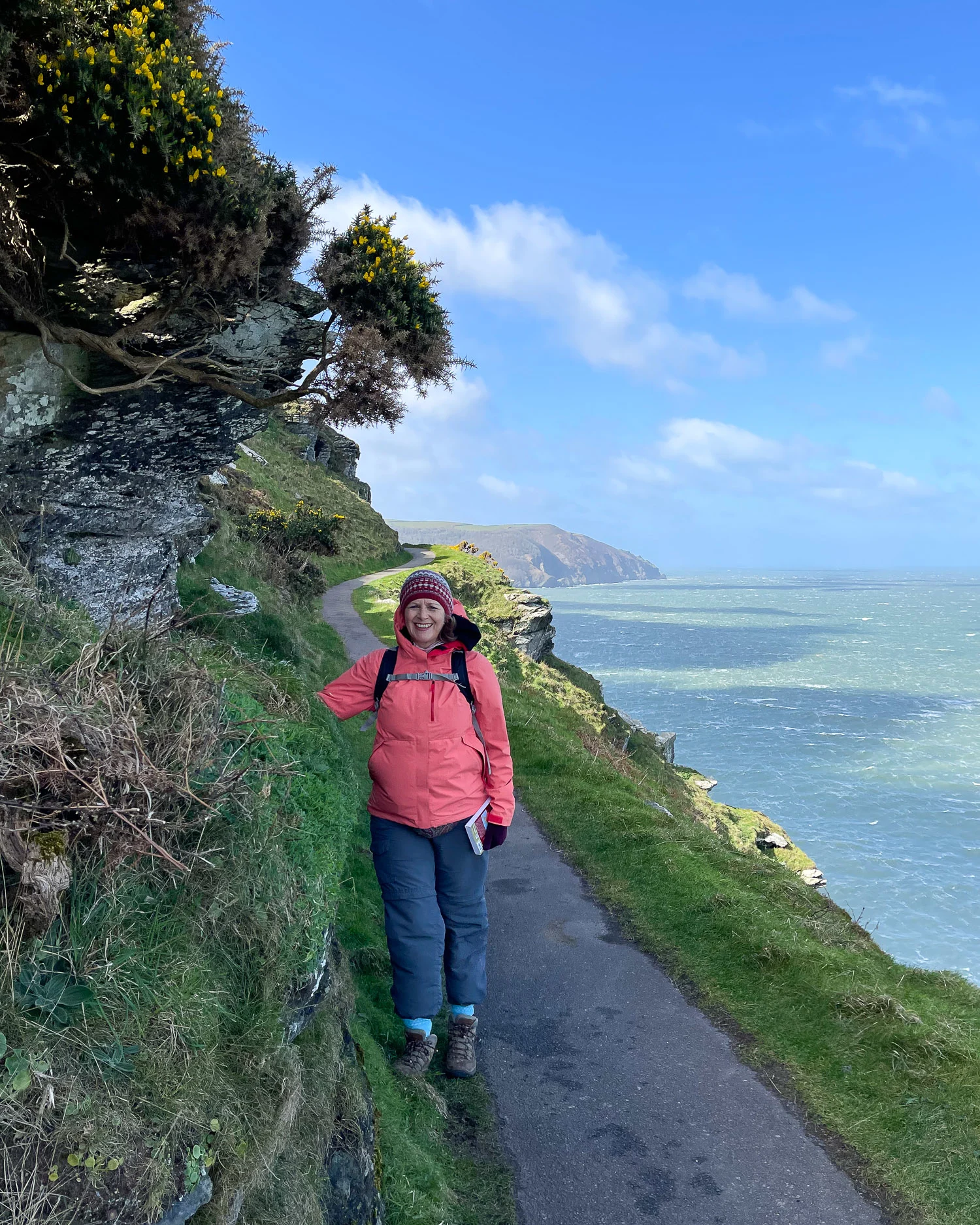
We continued on the path to Lee Abbey estate which is now a Christian retreat centre. Our route diverted away from the South West coastal path at Woody Bay.
We entered the pretty Heddon Valley where we had lunch at Hunter’s Inn before taking a taxi back to Lynmouth. You can also explore the South West coastal path in the opposite direction. Climb up from the beach to Countisbury Hill, overlooking Lynmouth and the coast.
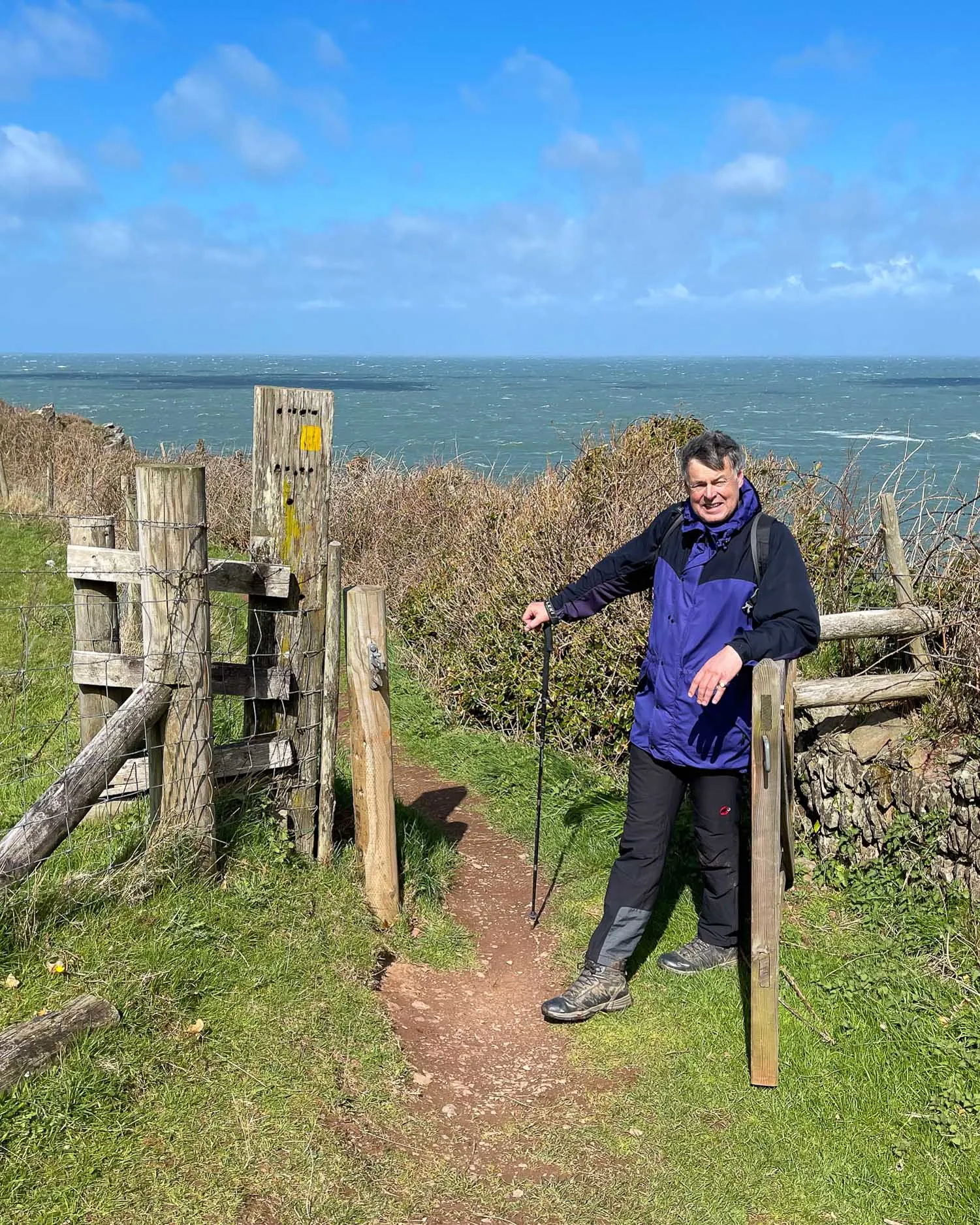
10. Watersmeet on Exmoor
Want to experience a classic Exmoor landscape of steep wooded valleys and mossy boulders? Take a walk from Lynmouth to Watersmeet on the path that runs along the banks of the East Lyn River.
The walk from Lynmouth takes around 40 minutes to reach the point where two tributaries of the river meet. The former fishing lodge has been converted to a cafe which is run by the National Trust.
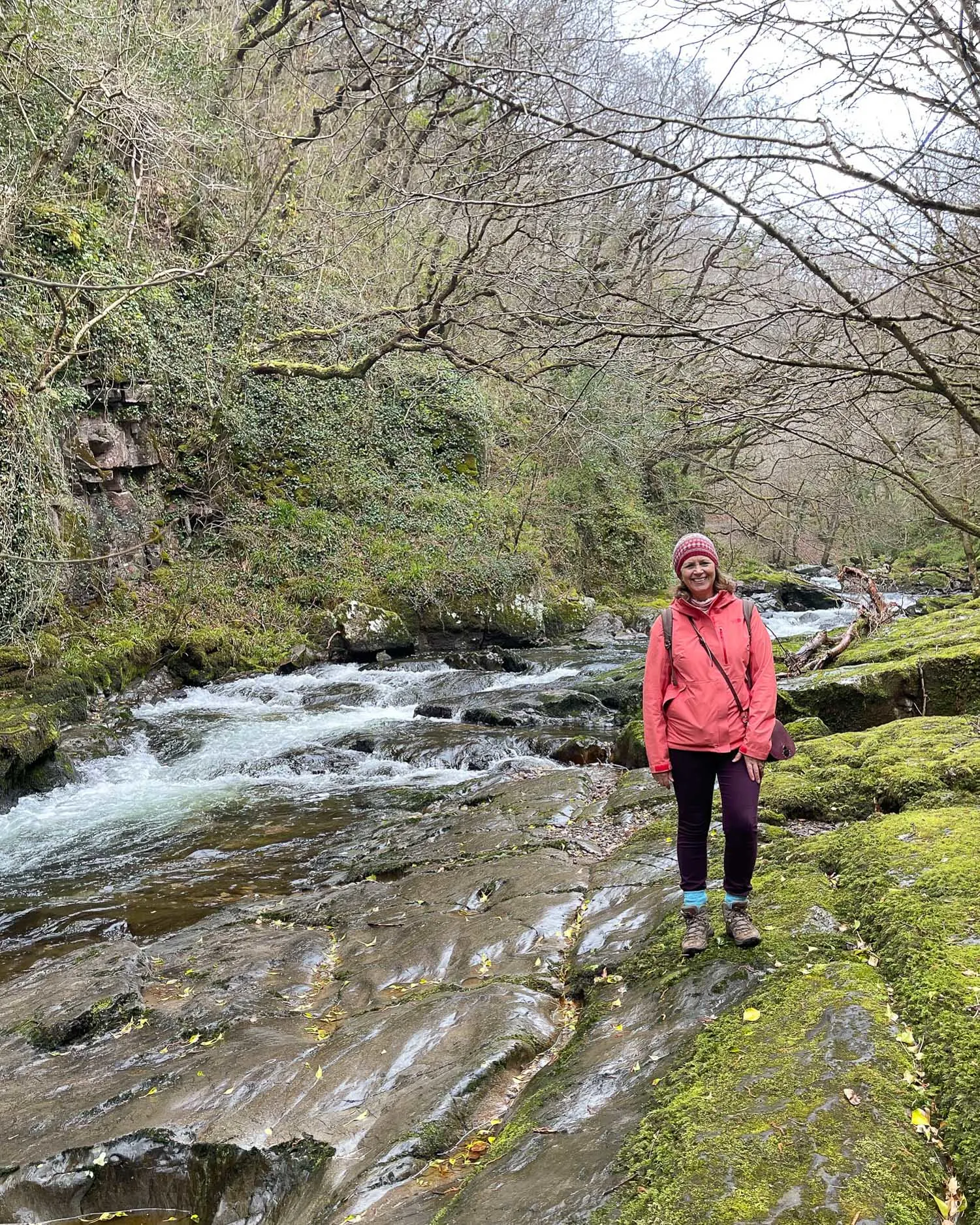
From here there numerous paths skirt the wooded slopes on both sides of the river. See water cascading over rocks and making waterfalls in places.
This romantic and picturesque landscape is a well known beauty spot that has inspired many artists from the 18th century onwards. If you prefer to visit by car, it’s a 10 mins drive from Lynmouth to the National Trust parking area beside the road. From here you can walk down the path to Watersmeet House and follow more walks from there.
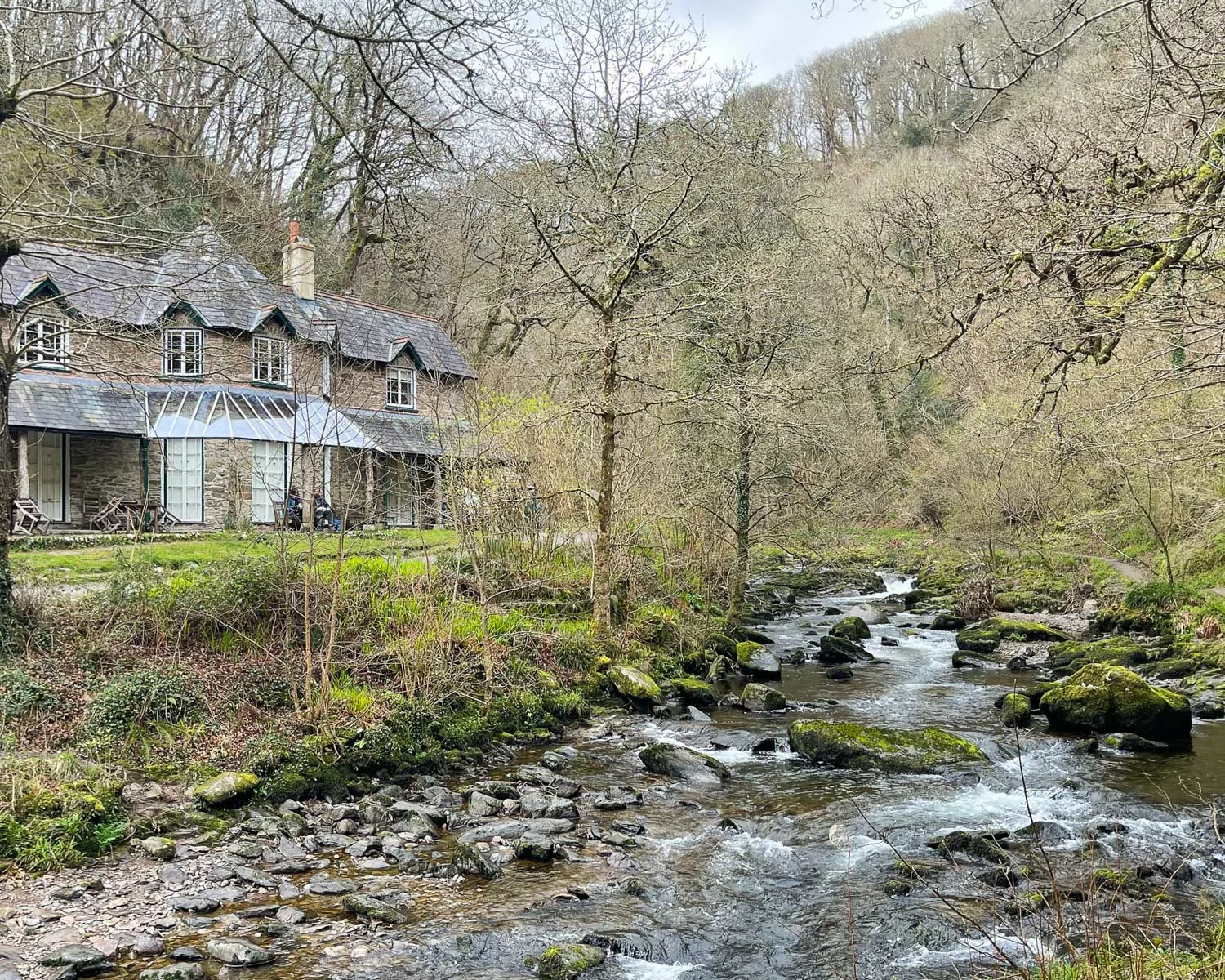

We stayed at Highcliffe House luxury B&B in Lynton, Devon – read my review
Other things to see near Lynton and Lynmouth
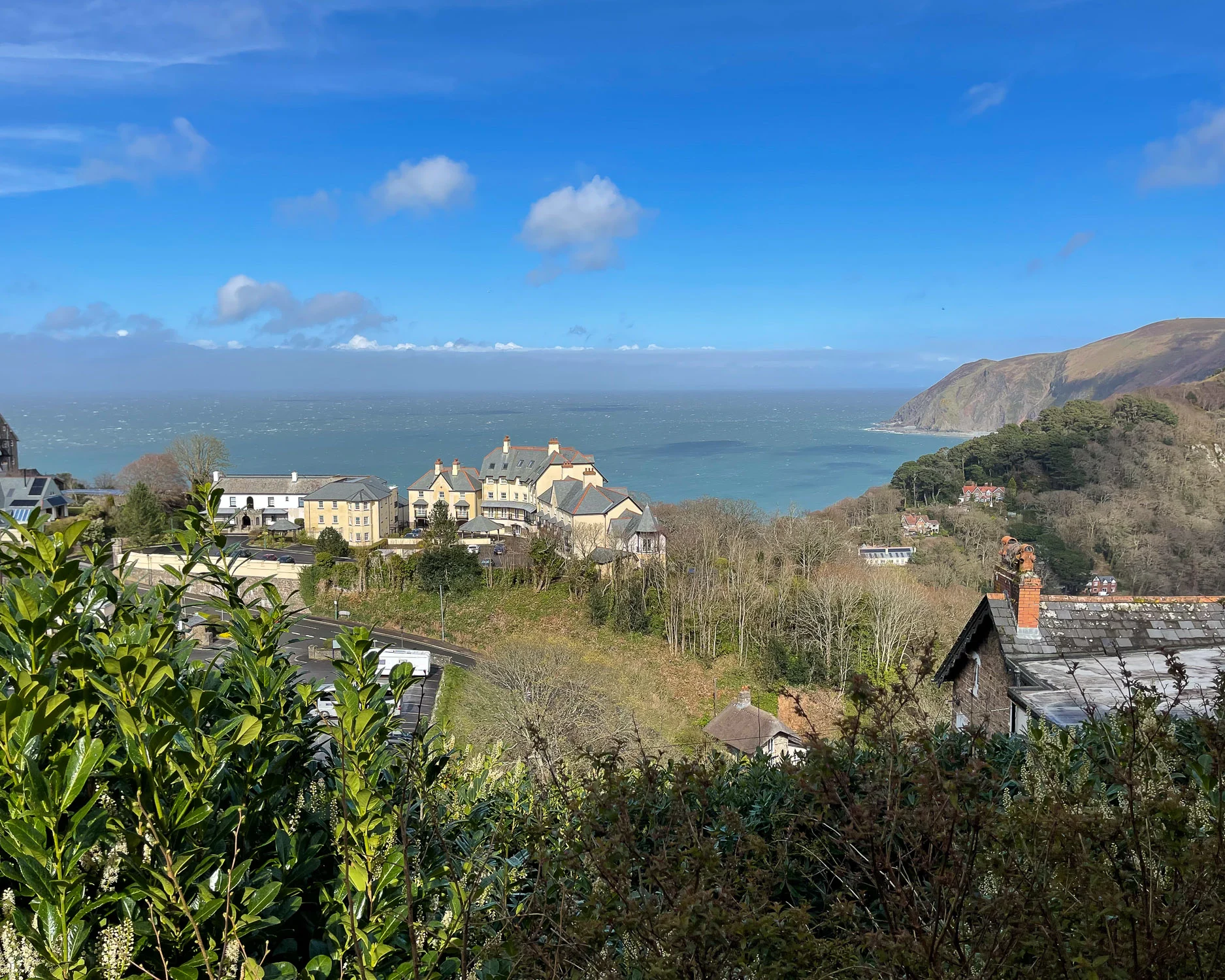
11. Lynton and Barnstable Railway
A short drive from Lynton and Lynmouth at Woody Bay is the Lynton and Barnstable Railway. This heritage steam railway has been restored as a visitor attraction.
The railway originally opened in 1898 and was intended to bring holiday makers from Barnstable to Woody Bay. Here a Victoria holiday resort was planned to rival that at Lynmouth.
The railway closed in 1935 but a 2 mile stretch of the original track has been restored. You can take a ride on the steam trains from Woody Bay Station to Killington Lane.
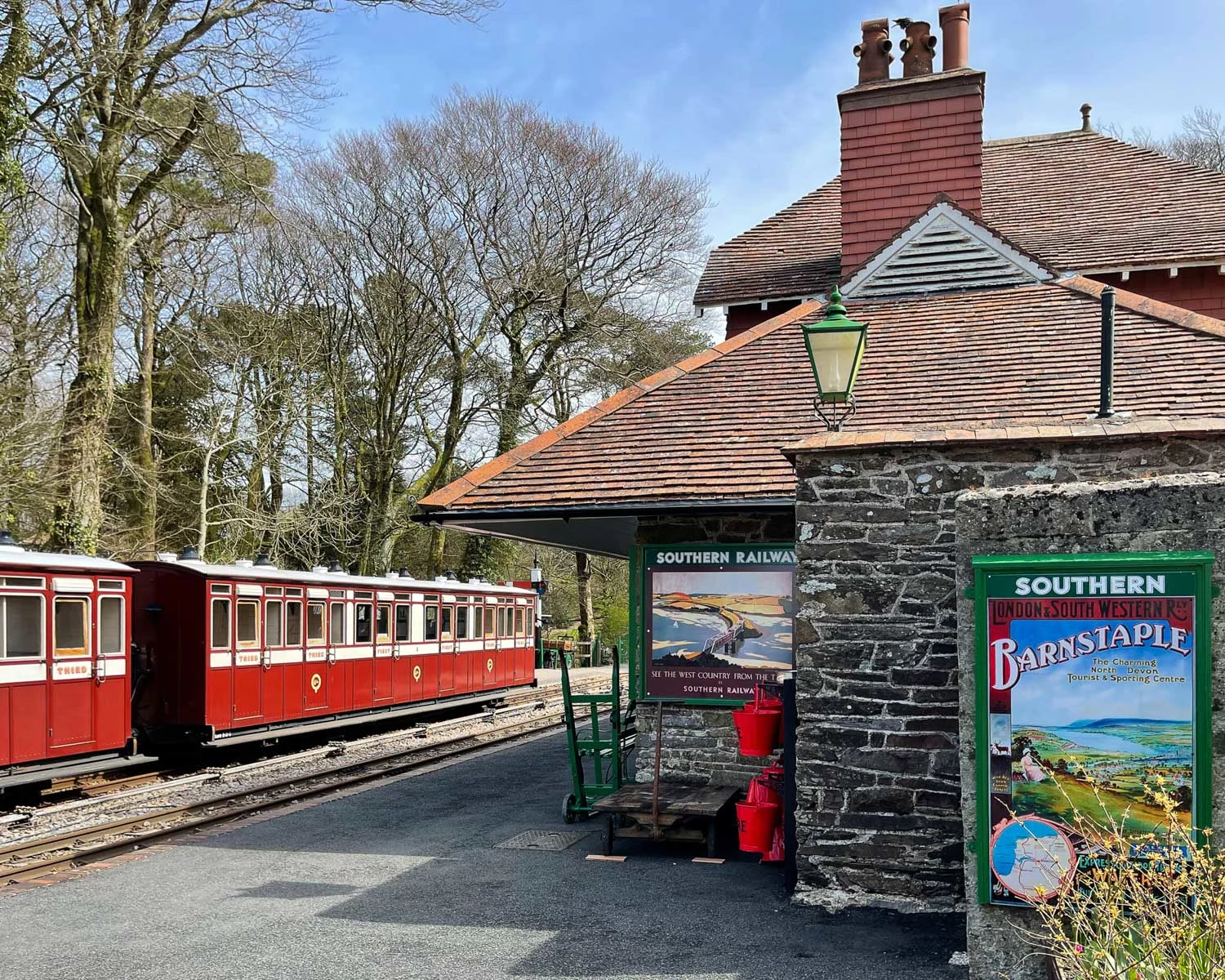
The round trip lasts around 25 minutes and trains run from May to October with seasonal events at Christmas and Easter. When we visited, the trains had not started running for the summer season.
Visit the station with its vintage train posters allowing visitors to step back in time to the golden age of railway travel. When the trains are running there’s a small tea room at Woody Bay station serving refreshments.
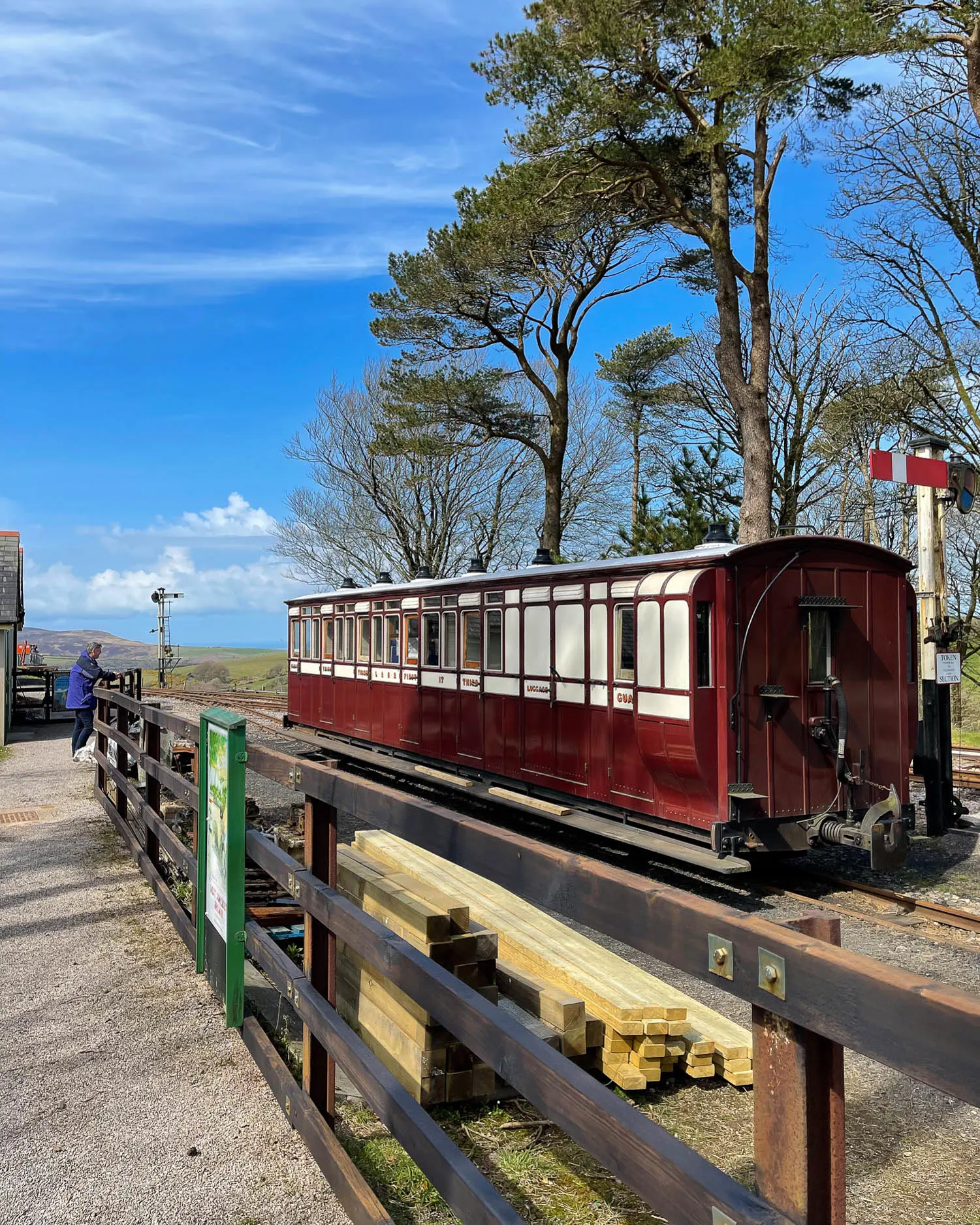
12. Dunster village in Somerset
On our drive down from Bristol we stopped at Dunster on the Somerset Coast. This is around a 45 minute drive from Lynton and Lynmouth.
Dunster is a pretty medieval town and a great place to spend a couple of hours or more. Visit on a day trip from Lynton and Lynmouth or as somewhere to stop en route.
Independent shops and cafes line the pretty High Street, overlooked by Dunster castle on the hill, that is open to visit with the National Trust.
Such is the well preserved charm of Dunster that it has featured in many film and TV productions. Agatha Christie’s Hercule Poirot and Enid Blyton’s Famous Five drama are examples.
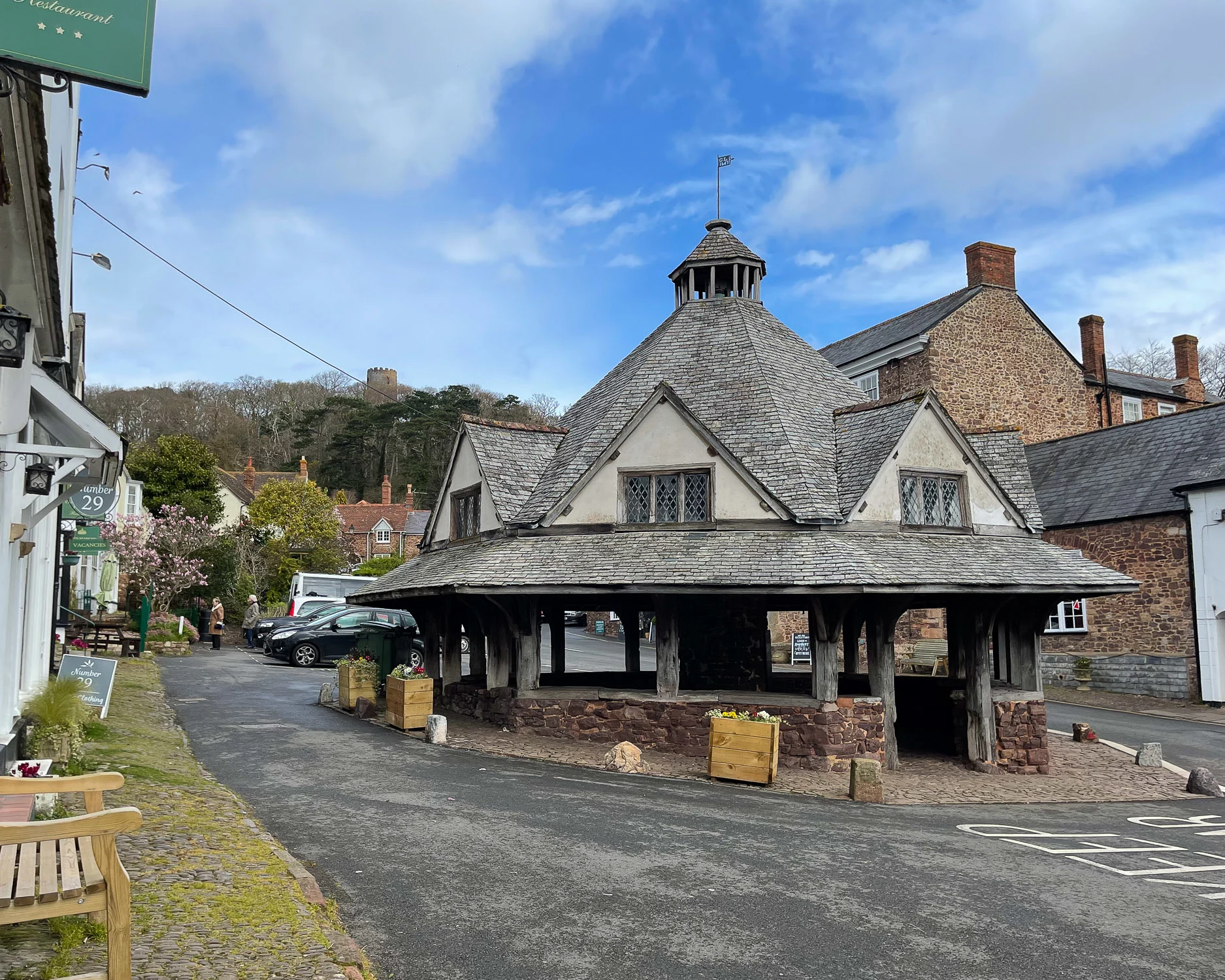
The octagonal Yarn Market building on the High Street dates back to the 17th century. At this time there was a thriving wool trade in Dunster, from the sheep grazing on Exmoor.
We explored the town’s side streets to discover a picturesque dovecote and tithe barn. St George’s village church and a flower filled walled garden is tended by volunteers.
Further round the side of the castle is a row of chocolate box thatched cottages on Park Street leading to the medieval Gallox packhorse bridge crossing the stream. Nearby is a working watermill and tea room, part of the National Trust estate that can be visited with the castle.
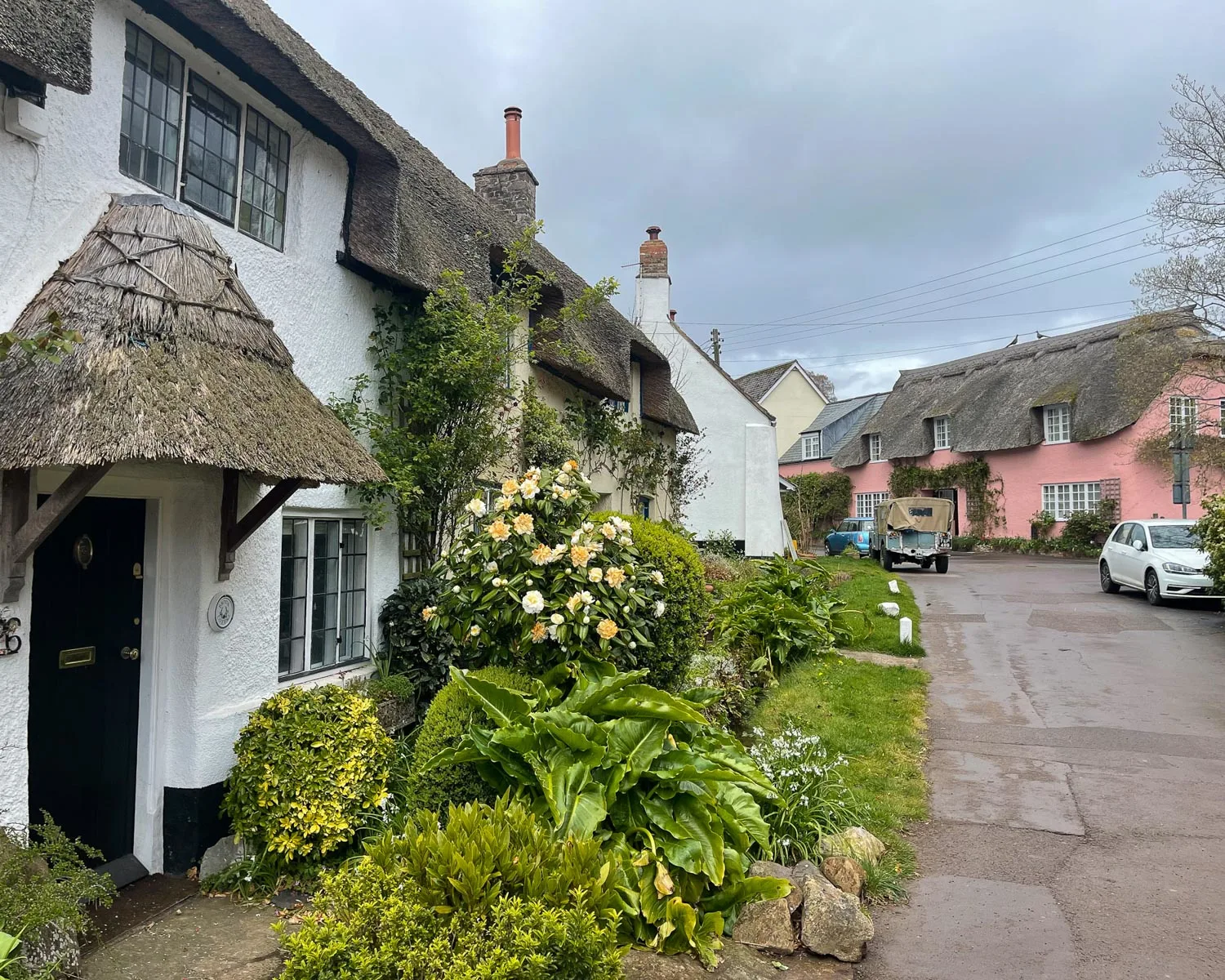
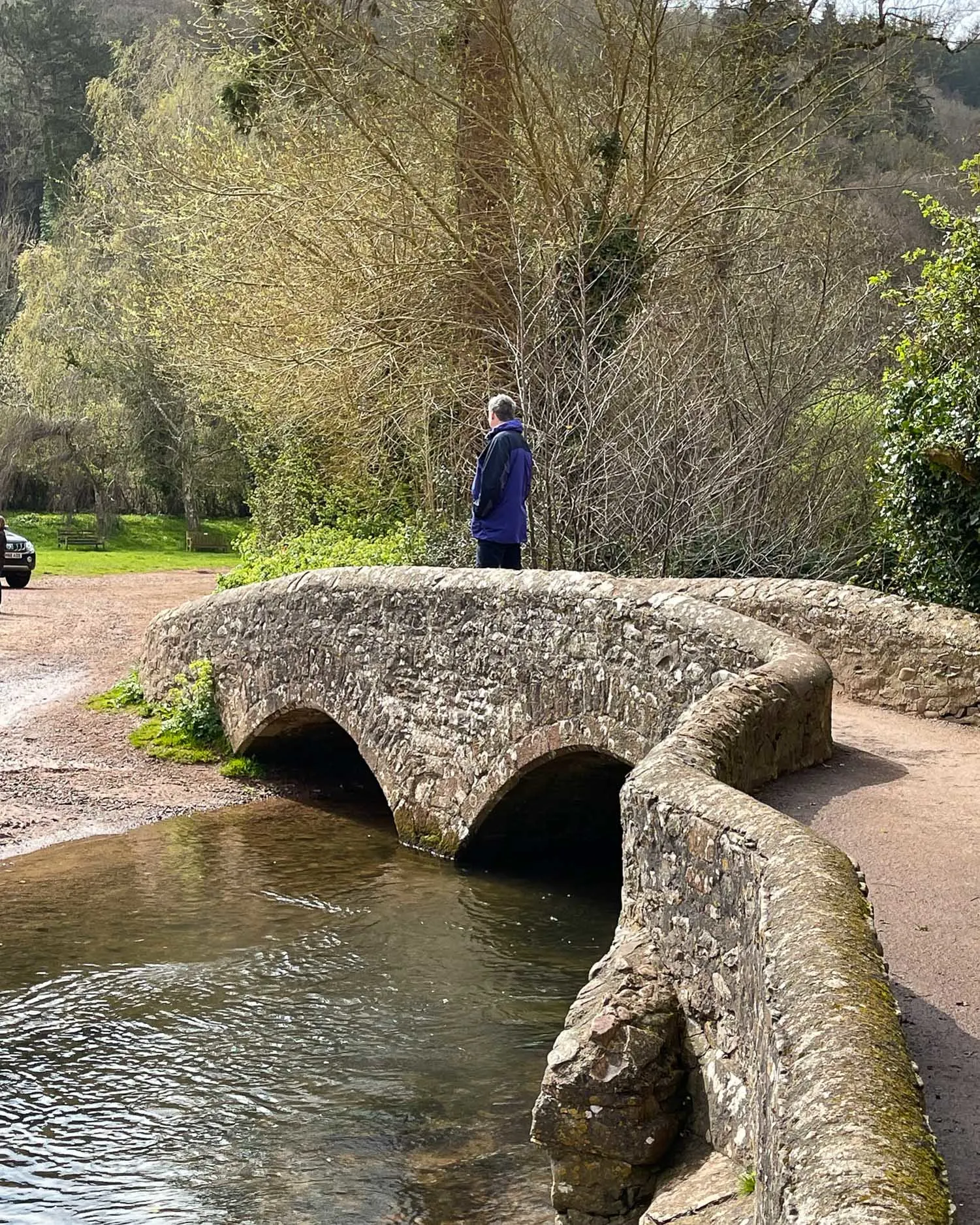
13. More to see in north Devon
There are many other places to visit in North Devon, that could make a good day trip or be visited en route to Lynton and Lynmouth.
Arlington Court ( 25 mins drive) – This National Trust property offers a Regency House with formal Victorian gardens and a carriage museum.
Clovelly Village ( 1 hr 10 mins drive) – This picture perfect Devon fishing village has cobbled streets leading down to the harbour. The village is especially popular in summer so consider the timing of your visit in peak season. There’s a charge to visit the village that includes parking and entrance to the small museums.
Marwood Hill Gardens ( 35 mins drive) – A privately owned 20 acre garden, set in a Devon valley with 3 lakes and a tea room.
RHS Gardens Rosemoor ( 1 hr drive) – The public garden of the Royal Horticultural Society, set in the Torridge Valley, with numerous formal garden areas and something to see in every season.
Doone Valley and Malmsmead ( 10 min drive) – the tiny village of Malmsmead and Badgworthy Valley are known as “Doone Country” made famous by the historical romantic novel by R D Blackmore that is set here. The National Trust manages Lorna Doone Farm and runs a car park and tea room, with many marked walks in the area.
14. Where to eat in Lynton and Lynmouth
We found plenty of recommendations on the Highcliffe House website for restaurants in Lynton that are just a short walk, as well as some suggestions further afield.
Old Bank Lynton – In the centre of Lynton is the Old Bank, located in a cosy restaurant on the lower floor of the old building that had once been a bank. The restaurant specialises in cuts of beef from the Exmoor National Park.
If steak is not your thing, there are some good fish options such as the Dover Sole I tried which was the fish of the day. It came with a dish of creamy leeks and peas with bacon and I ordered a side of truffle oil mashed potato, both of which were very tasty.
Guy really enjoyed his steak too (so many choices for meat lovers!) and all the sides we ordered such as garlic mushrooms, salad and chips were top notch.
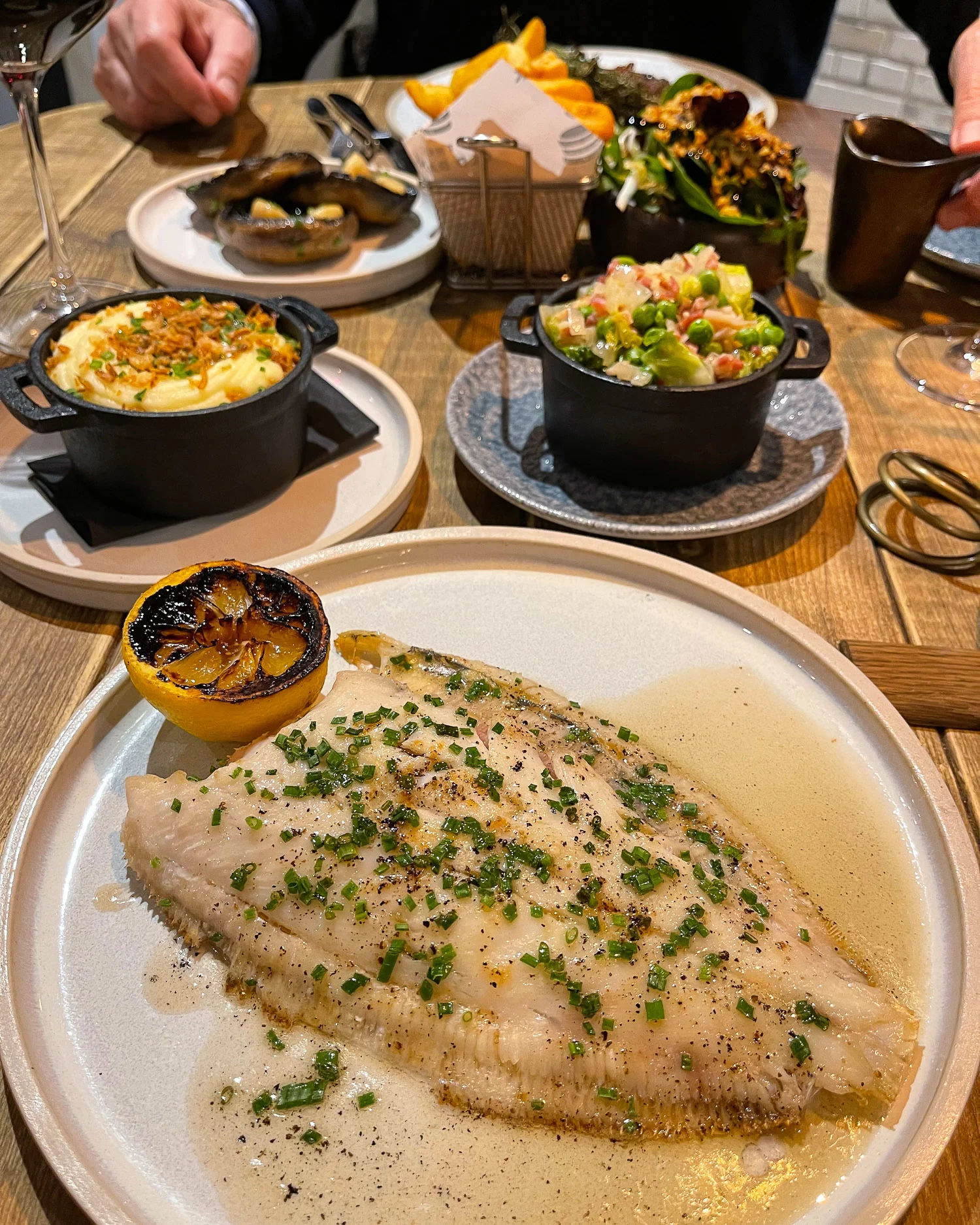
Oak Room – Located on the main street in Lynton they specialise in Spanish style tapas, with lots of fish and meat dishes to share. We didn’t eat there but it came recommended.
Nartnapa Thai Kitchen at The Cottage Inn – Below the Highcliffe House guest house runs a narrow lane, Lyn Way which will take you in a pleasant 15 minute walk to Cottage Inn at Lynbridge. We didn’t eat here but heard good things about the pub with a Thai restaurant that’s run by the chef / co-owner who is from Thailand.
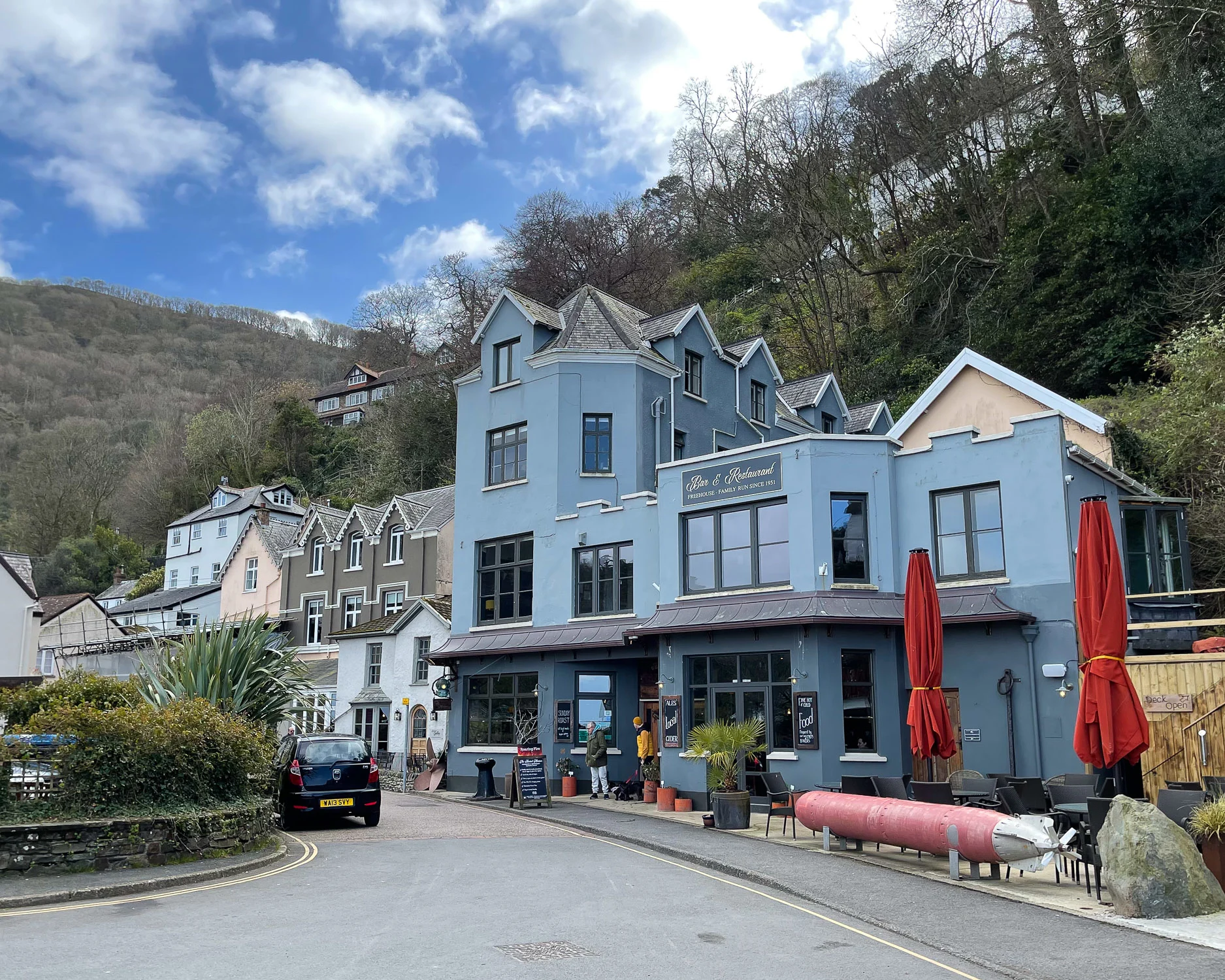
More dining options
Bath Hotel and Ancient Mariner bar – Set on the waterfront in Lynmouth the Ancient Mariner pub is full of nautical memorabilia and has a lively atmosphere. You can eat in the bar but tables are not bookable, so it’s first come first served.
We booked our table in the adjoining Bath Hotel restaurant, although it was rather quiet and lacking in atmosphere when we visited. The same pub style menu covers both the bar and restaurant. We’d recommend eating in the Ancient Mariner bar if you can get a table, as it seemed much more jolly.
There are many other coffee shops in both Lynton and Lynmouth that tend to open in the daytime for brunch and lunch, but are closed in the evening. In Lynton take a look at Charlie Friday’s Coffee Shop or North Coast Cafe although there are numerous others in Lynton and Lynmouth.
15. Places to stay in Lynton and Lynmouth
Perched on the hillside above Lynton, Highcliffe House is a luxurious boutique guest house. It offers adult only stays, with sea views and a personal touch. Once you’ve sunk into your comfy antique bed, admired the owners’ eclectic art collection and enjoyed the top quality local produce of their cooked breakfasts, you’ll see why Highcliffe House was voted one of the best luxury B & B’s in Devon.
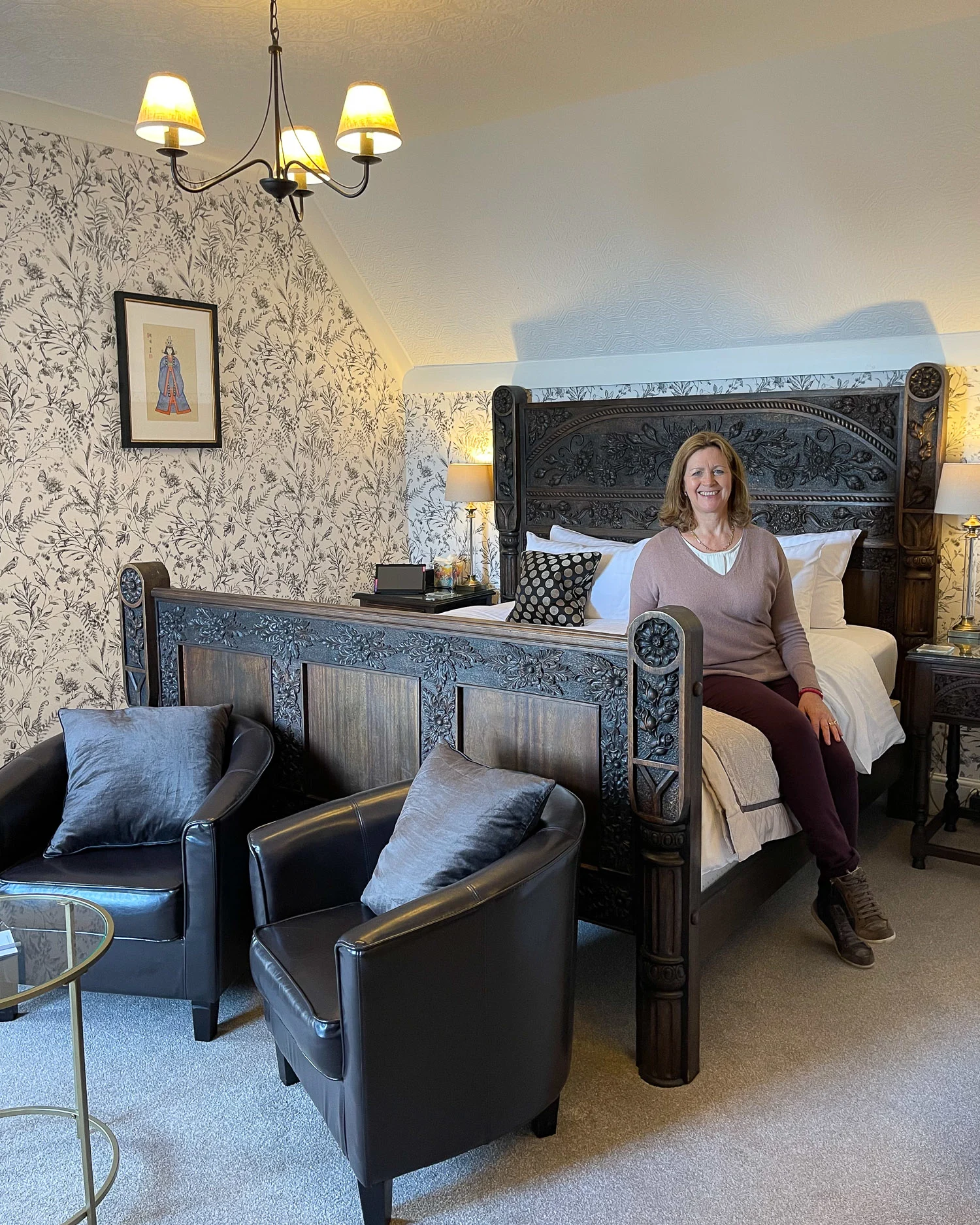
With just six rooms Highcliffe House has all the individual charm you’d look for in a boutique hotel. It will appeal to those who normally stay in a small luxury hotel. It’s technically a bed and breakfast or guest house since it doesn’t have a restaurant, although the Devon cream teas and gin bar are most welcome! Read my review of Highcliffe House here.
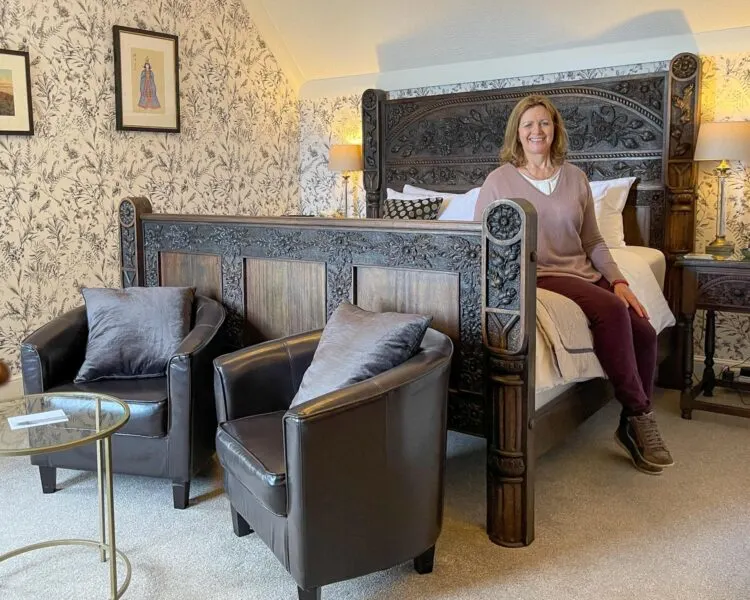
We stayed at Highcliffe House luxury B&B in Lynton, Devon – read my review
Highcliffe House website | Check availability and prices or call +44 (0)1598 752235 to discuss your requirements. During the winter months, Highcliffe House is available to rent as a self catering holiday house, ideal for luxury group stays.
Getting to Lynton and Lynmouth Devon
Lynton and Lynmouth are located on the north Devon coast, in the South West of England. They are most easily accessible by road and are around 2hrs drive from Bristol, and 4 hrs drive from London.
If you prefer to leave the car at home and use public transport, then take the train to Tiverton Parkway (75km) or Taunton (70km). Both stations offer direct train services from Bristol, London and Birmingham. From here you will need to book a taxi to take you to Lynton and Lynmouth (around 1 hr).
Alternatively travel by train to Barnstable (changing trains in Exeter) and from here take one of the buses that run throughout the day from Barnstable to Lynton and Lynmouth (journey time 1 hr). Once you arrive in Lynton and Lynmouth most of the places mentioned can be reached on foot or via the cliff railway.
Taxi services are also available in the town in case you want to make some longer walks then book a taxi back (as we did from Hunter’s Inn in the Heddon Valley). There is a regular bus no 309 / 310 to and from Barnstable and in summer the Exmoor Coaster bus connects Lynmouth with Countisbury, Porlock, Minehead and Watchet.
Plan your visit to Lynton and Lynmouth
More information to plan what to do locally is on the Visit Lynton and Lynmouth website and the Visit North Devon website
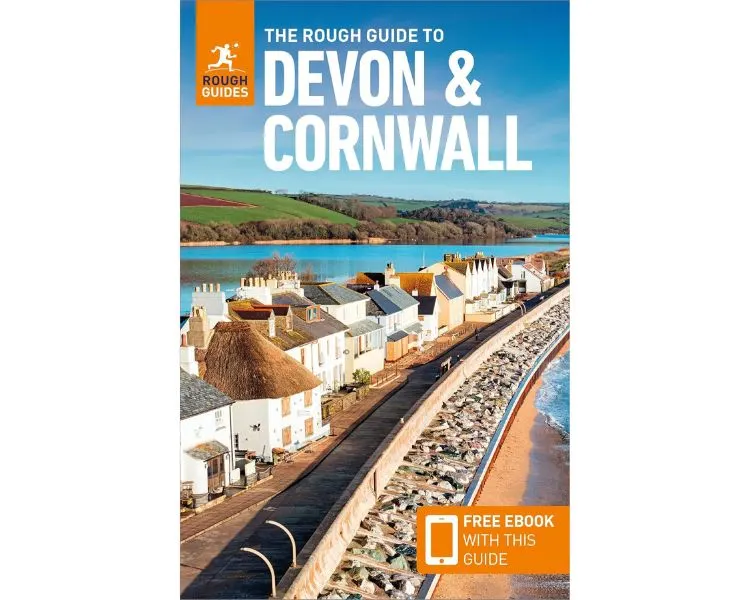
Need a guidebook for Devon? We recommend the Rough Guide to Devon and Cornwall
Read Next
Read about our stay in Lynton and Lynmouth at Highcliffe House
Pin It
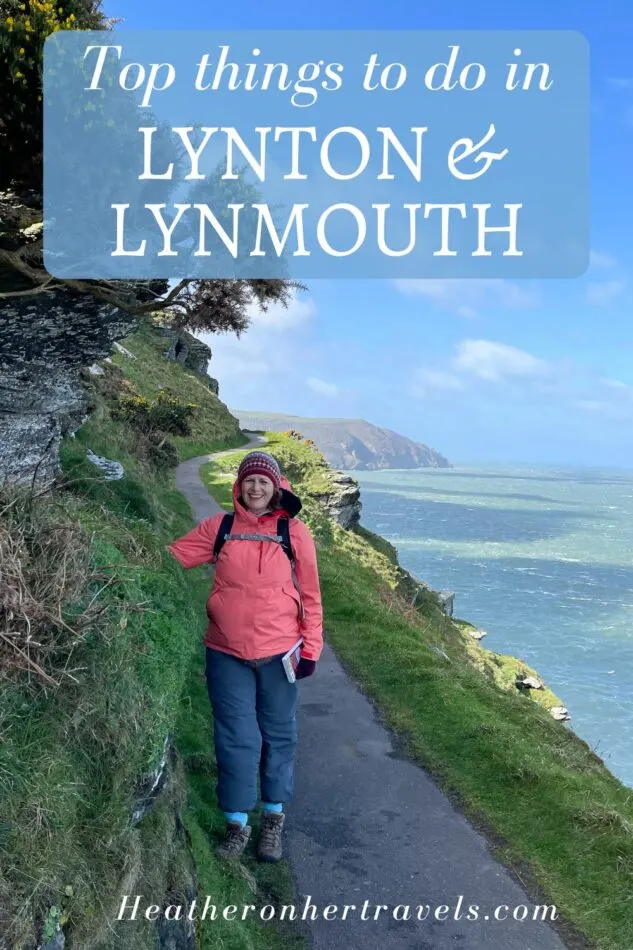
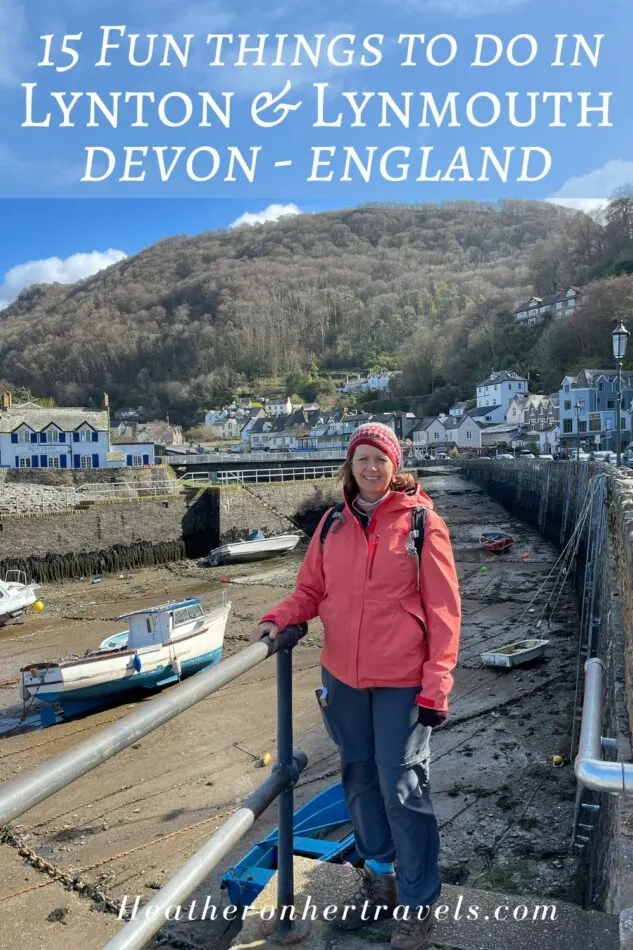
Our 2 night stay in Lynton and Lynmouth was hosted* by Highcliffe House
* More info on my policies page
This article is originally published at Heatheronhertravels.com


